Paul A Biography
Paul A Biography
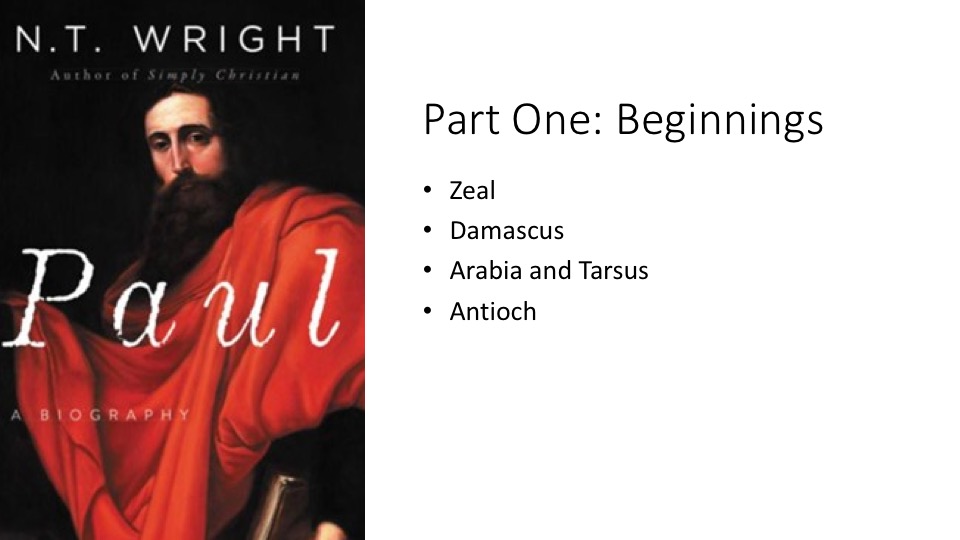
Part One: Beginnings
•Zeal
•Damascus
•Arabia and Tarsus
•Antioch
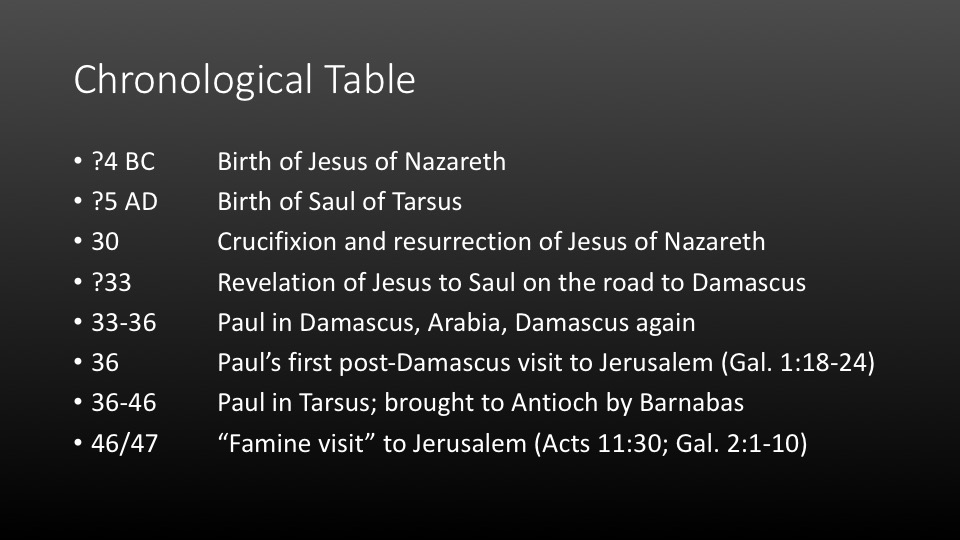
Chronological Table
N. T. Wright first supplies a compete Chronological Table of the life of Paul
4 BC Birth of Jesus of Nazareth
?5 AD Birth of Saul of Tarsus
30 Crucifixion and resurrection of Jesus of Nazareth
?33 Revelation of Jesus to Saul on the road to Damascus
33-36 Paul in Damascus, Arabia, Damascus again
36 Paul’s first post-Damascus visit to Jerusalem (Gal. 1:18-24)
36-46 Paul in Tarsus; brought to Antioch by Barnabas
46/47 “Famine visit” to Jerusalem (Acts 11:30; Gal. 2:1-10)
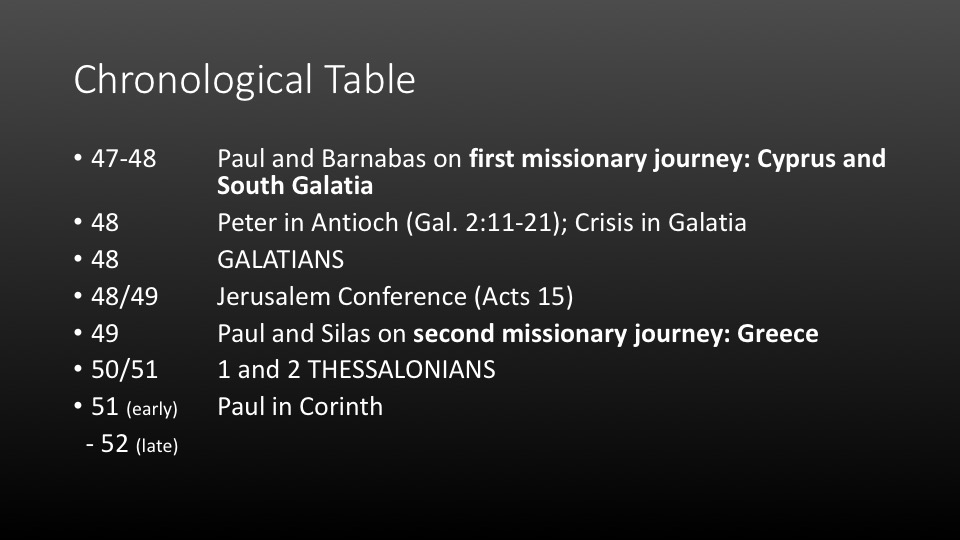
Chronological Table (2)
47-48 Paul and Barnabas on first missionary journey: Cyprus and South Galatia
48 Peter in Antioch (Gal. 2:11-21); Crisis in Galatia
48 GALATIANS
48/49 Jerusalem Conference (Acts 15)
49 Paul and Silas on second missionary journey: Greece
50/51 1 and 2 THESSALONIANS
51 (early) Paul in Corinth
- 52 (late)
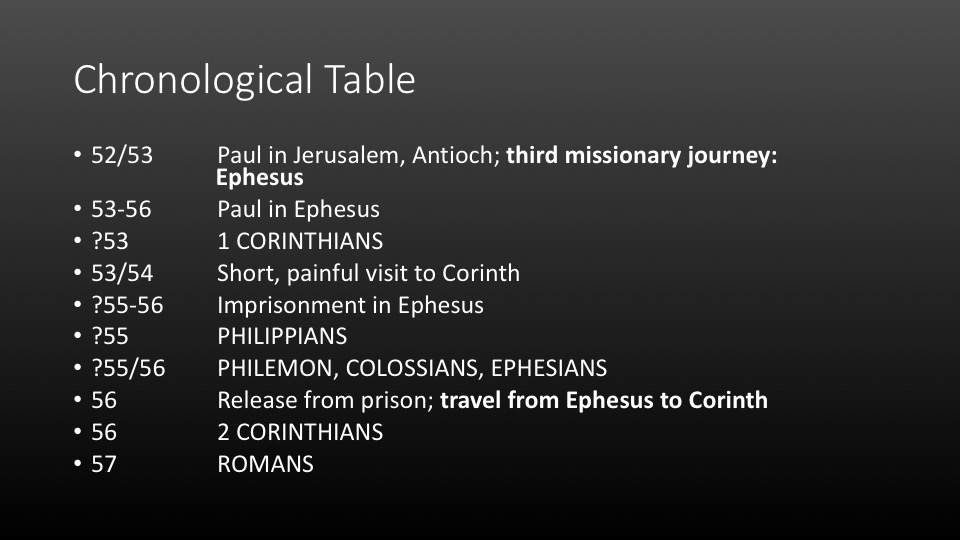
Chronological Table
52/53 Paul in Jerusalem, Antioch; third missionary journey:Ephesus
53-56 Paul in Ephesus
?53 1 CORINTHIANS
53/54 Short, painful visit to Corinth
?55-56 Imprisonment in Ephesus
?55 PHILIPPIANS
?55/56 PHILEMON, COLOSSIANS, EPHESIANS
56 Release from prison; travel from Ephesus to Corinth
56 2 CORINTHIANS
57 ROMANS
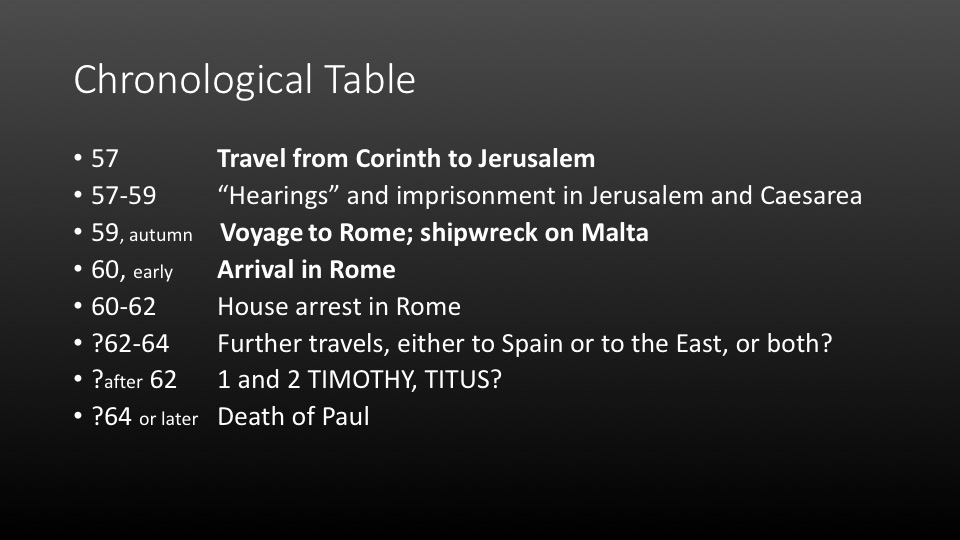
Chronological Table
57 Travel from Corinth to Jerusalem
57-59 “Hearings” and imprisonment in Jerusalem and Caesarea
59, autumn Voyage to Rome; shipwreck on Malta
60, early Arrival in Rome
60-62 House arrest in Rome
?62-64 Further travels, either to Spain or to the East, or both?
?after 62 1 and 2 TIMOTHY, TITUS?
?64 or later Death of Paul
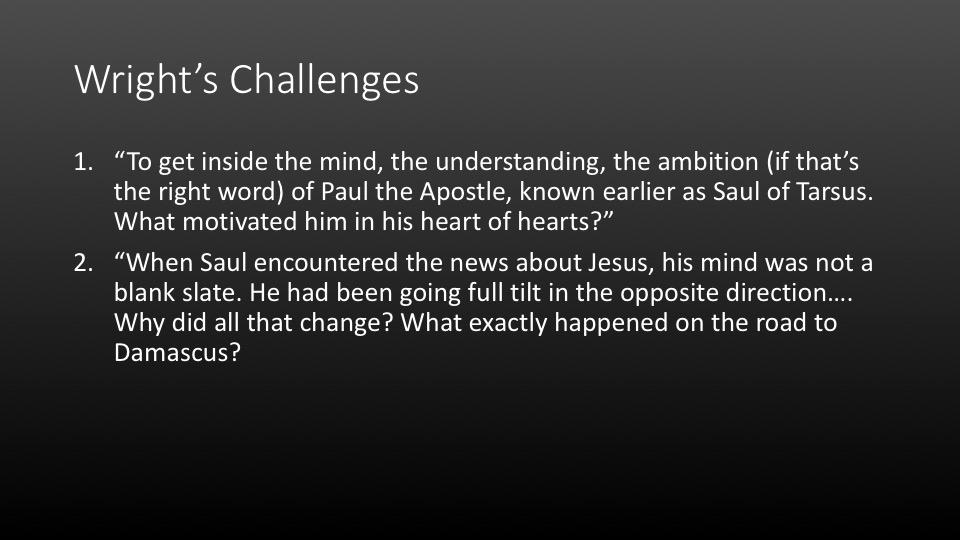
Wright’s Challenges
1.“To get inside the mind, the understanding, the ambition (if that’s the right word) of Paul the Apostle, known earlier as Saul of Tarsus. What motivated him in his heart of hearts?”
2.“When Saul encountered the news about Jesus, his mind was not a blank slate. He had been going full tilt in the opposite direction…. Why did all that change? What exactly happened on the road to Damascus?
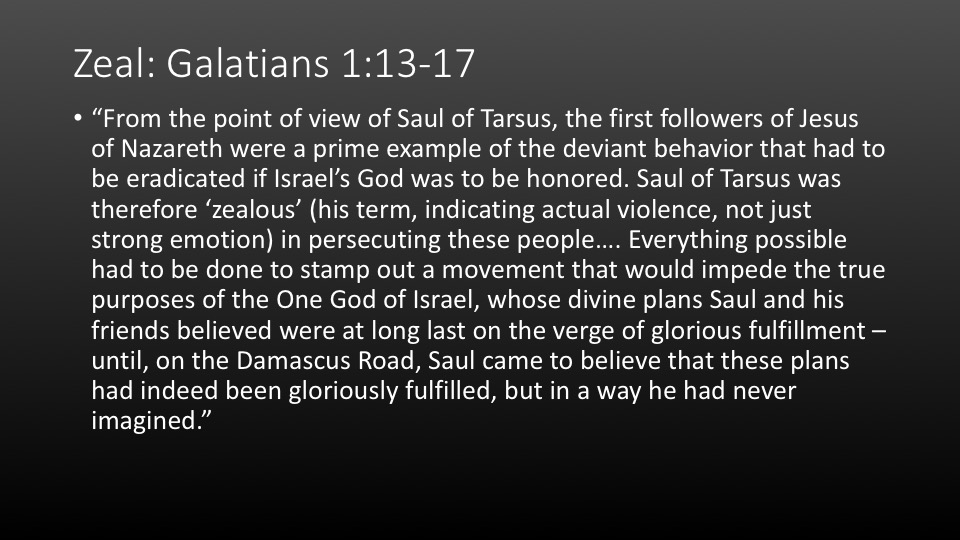
Paul A Biography [Scripture]
Zeal: Galatians 1:13-17
13 You heard about my previous life in Judaism, how severely I harassed God’s church and tried to destroy it. 14 I advanced in Judaism beyond many of my peers, because I was much more militant about the traditions of my ancestors. 15 But God had set me apart from birth and called me through his grace. He was pleased 16 to reveal his Son to me, so that I might preach about him to the Gentiles. I didn’t immediately consult with any human being. 17 I didn’t go up to Jerusalem to see the men who were apostles before me either, but I went away into Arabia and I returned again to Damascus.
Wright's View
“From the point of view of Saul of Tarsus, the first followers of Jesus of Nazareth were a prime example of the deviant behavior that had to be eradicated if Israel’s God was to be honored. Saul of Tarsus was therefore ‘zealous’ (his term, indicating actual violence, not just strong emotion) in persecuting these people…. Everything possible had to be done to stamp out a movement that would impede the true purposes of the One God of Israel, whose divine plans Saul and his friends believed were at long last on the verge of glorious fulfillment – until, on the Damascus Road, Saul came to believe that these plans had indeed been gloriously fulfilled, but in a way he had never imagined.”
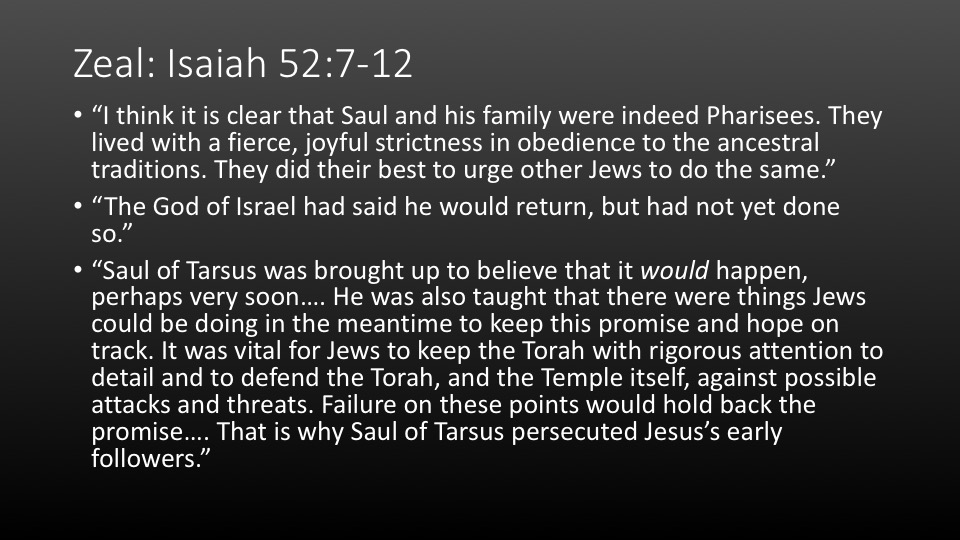
Paul A Biography [Scripture]
Zeal: Isaiah 52:7-12
7 How beautiful upon the mountains
are the feet of a messenger
who proclaims peace,
who brings good news,
who proclaims salvation,
who says to Zion, “Your God rules!”
8 Listen! Your lookouts lift their voice;
they sing out together!
Right before their eyes they see the Lord returning to Zion.
9 Break into song together, you ruins of Jerusalem!
The Lord has comforted his people and has redeemed Jerusalem.
10 The Lord has bared his holy arm in view of all the nations;
all the ends of the earth have seen our God’s victory.
11 Depart! Depart! Go out from there!
Unclean! Don’t touch!
Get out of that place; purify yourselves,
carriers of the Lord’s equipment!
12 You won’t go out in a rush,
nor will you run away,
because the one going before you is the Lord;
your rear guard is the God of Israel.
Wright's View
“I think it is clear that Saul and his family were indeed Pharisees. They lived with a fierce, joyful strictness in obedience to the ancestral traditions. They did their best to urge other Jews to do the same.”
“The God of Israel had said he would return, but had not yet done so.”
“Saul of Tarsus was brought up to believe that it would happen, perhaps very soon…. He was also taught that there were things Jews could be doing in the meantime to keep this promise and hope on track. It was vital for Jews to keep the Torah with rigorous attention to detail and to defend the Torah, and the Temple itself, against possible attacks and threats. Failure on these points would hold back the promise…. That is why Saul of Tarsus persecuted Jesus’s early followers.”
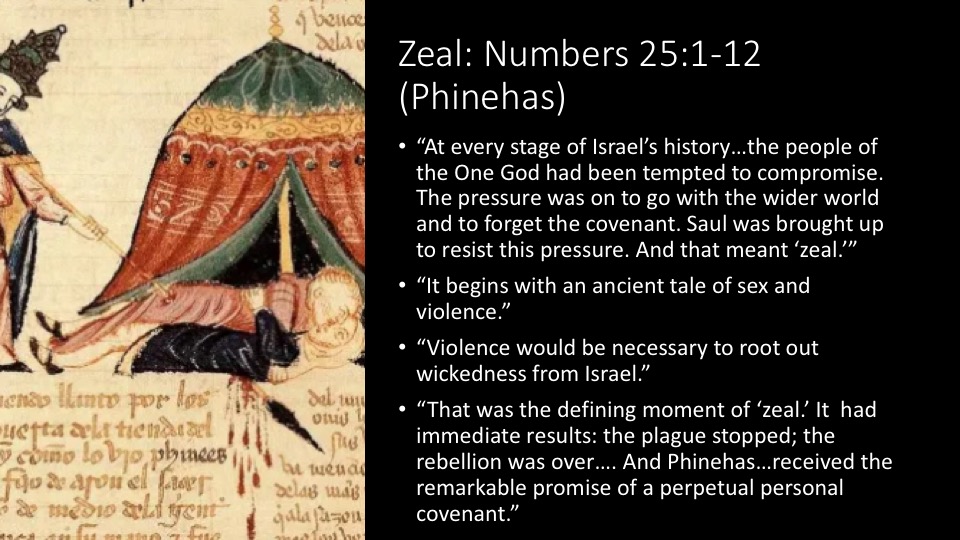
Paul A Biography [Scripture]
Zeal: Numbers 25: 1-12
25:1 When the Israelites lived at Shittim, the people made themselves impure by having illicit sex with Moabite women. 2 The Moabite women invited the people to the sacrifices for their god. So the people ate a meal, and they worshipped their god. 3 Israel became attached to the Baal of Peor, and the Lord was angry at the Israelites. 4 The Lord said to Moses: Take all the leaders of the people and kill them on behalf of the Lord in broad daylight, so that the Lord’s anger turns away from Israel.
5 Then Moses said to Israel’s officials, “Each of you: kill your men who are attached to the Baal of Peor.”
6 An Israelite man brought a Midianite woman to his brothers in the sight of Moses and the entire Israelite community, who were weeping at the entrance of the meeting tent. 7 When Phinehas (Eleazar’s son and Aaron the priest’s grandson) saw this, he arose in the middle of the community, took a spear in his hand, 8 went after the Israelite man into the chamber, and stabbed the two of them, the Israelite man and the woman, through the stomach. Then the plague stopped spreading among the Israelites. 9 Yet those who died by the plague numbered twenty-four thousand.
10 The Lord spoke to Moses: 11 Phinehas (Eleazar’s son and Aaron the priest’s grandson) has turned back my rage toward the Israelites. Because he was jealous for me among you, I didn’t consume the Israelites due to my jealousy. 12 Therefore, say: I’m now giving him my covenant of well-being.
Wright's View
“At every stage of Israel’s history…the people of the One God had been tempted to compromise. The pressure was on to go with the wider world and to forget the covenant. Saul was brought up to resist this pressure. And that meant ‘zeal.’”
“It begins with an ancient tale of sex and violence.”
“Violence would be necessary to root out wickedness from Israel.”
“That was the defining moment of ‘zeal.’ It had immediate results: the plague stopped; the rebellion was over…. And Phinehas…received the remarkable promise of a perpetual personal covenant.”
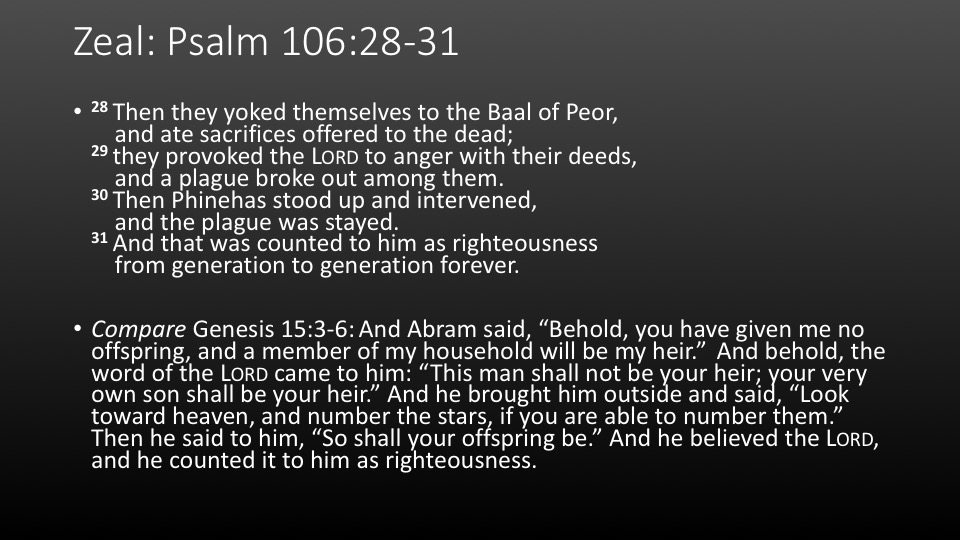
Paul A Biography [Scripture]
Zeal: Psalm 106:28-31
28 Then they yoked themselves to the Baal of Peor, and ate sacrifices offered to the dead;
29 they provoked the Lord to anger with their deeds, and a plague broke out among them.
30 Then Phinehas stood up and intervened, and the plague was stayed.
31 And that was counted to him as righteousness from generation to generation forever.
Compare Genesis 15:3-6:
And Abram said, “Behold, you have given me no offspring, and a member of my household will be my heir.” And behold, the word of the Lord came to him: “This man shall not be your heir; your very own son shall be your heir.” And he brought him outside and said, “Look toward heaven, and number the stars, if you are able to number them.” Then he said to him, “So shall your offspring be.” And he believed the Lord, and he counted it to him as righteousness.
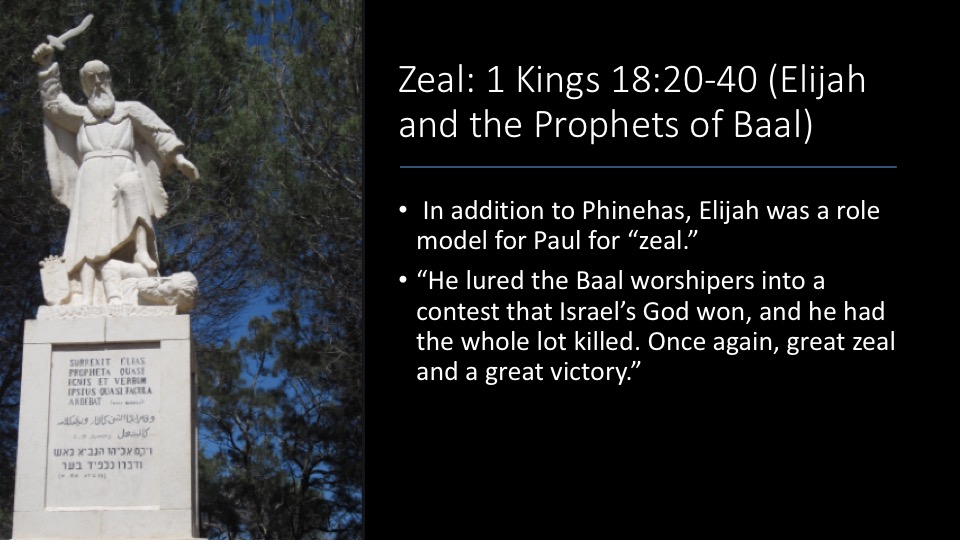
Paul A Biography [Scripture]
Zeal: 1 Kings 18:20-40 (Elijah and the Prophets of Baal)
20 Ahab sent the message to all the Israelites. He gathered the prophets at Mount Carmel. 21 Elijah approached all the people and said, “How long will you hobble back and forth between two opinions? If the Lord is God, follow God. If Baal is God, follow Baal.” The people gave no answer.
22 Elijah said to the people, “I am the last of the Lord’s prophets, but Baal’s prophets number four hundred fifty. 23 Give us two bulls. Let Baal’s prophets choose one. Let them cut it apart and set it on the wood, but don’t add fire. I’ll prepare the other bull, put it on the wood, but won’t add fire. 24 Then all of you will call on the name of your god, and I will call on the name of the Lord. The god who answers with fire—that’s the real God!”
All the people answered, “That’s an excellent idea.”
25 So Elijah said to the prophets of Baal, “Choose one of these bulls. Prepare it first since there are so many of you. Call on the name of your god, but don’t add fire.”
26 So they took one of the bulls that had been brought to them. They prepared it and called on Baal’s name from morning to midday. They said, “Great Baal, answer us!” But there was no sound or answer. They performed a hopping dance around the altar that had been set up.
27 Around noon, Elijah started making fun of them: “Shout louder! Certainly he’s a god! Perhaps he is lost in thought or wandering or traveling somewhere. Or maybe he is asleep and must wake up!”
28 So the prophets of Baal cried with a louder voice and cut themselves with swords and knives as was their custom. Their blood flowed all over them. 29 As noon passed they went crazy with their ritual until it was time for the evening offering. Still there was no sound or answer, no response whatsoever.
30 Then Elijah said to all the people, “Come here!” All the people closed in, and he repaired the Lord’s altar that had been damaged. 31 Elijah took twelve stones, according to the number of the tribes of the sons of Jacob—to whom the Lord’s word came: “Your name will be Israel.” 32 He built the stones into an altar in the Lord’s name, and he dug a trench around the altar big enough to hold two seahs of dry grain. 33 He put the wood in order, butchered the bull, and placed the bull on the wood. “Fill four jars with water and pour it on the sacrifice and on the wood,” he commanded. 34 “Do it a second time!” he said. So they did it a second time. “Do it a third time!” And so they did it a third time. 35 The water flowed around the altar, and even the trench filled with water. 36 At the time of the evening offering, the prophet Elijah drew near and prayed: “Lord, the God of Abraham, Isaac, and Israel, let it be known today that you are God in Israel and that I am your servant. I have done all these things at your instructions. 37 Answer me, Lord! Answer me so that this people will know that you, Lord, are the real God and that you can change their hearts.” 38 Then the Lord’s fire fell; it consumed the sacrifice, the wood, the stones, and the dust. It even licked up the water in the trench!
39 All the people saw this and fell on their faces. “The Lord is the real God! The Lord is the real God!” they exclaimed.
40 Elijah said to them, “Seize Baal’s prophets! Don’t let any escape!” The people seized the prophets, and Elijah brought them to the Kishon Brook and killed them there.
In addition to Phinehas, Elijah was a role model for Paul for “zeal.”
“He lured the Baal worshipers into a contest that Israel’s God won, and he had the whole lot killed. Once again, great zeal and a great victory.”
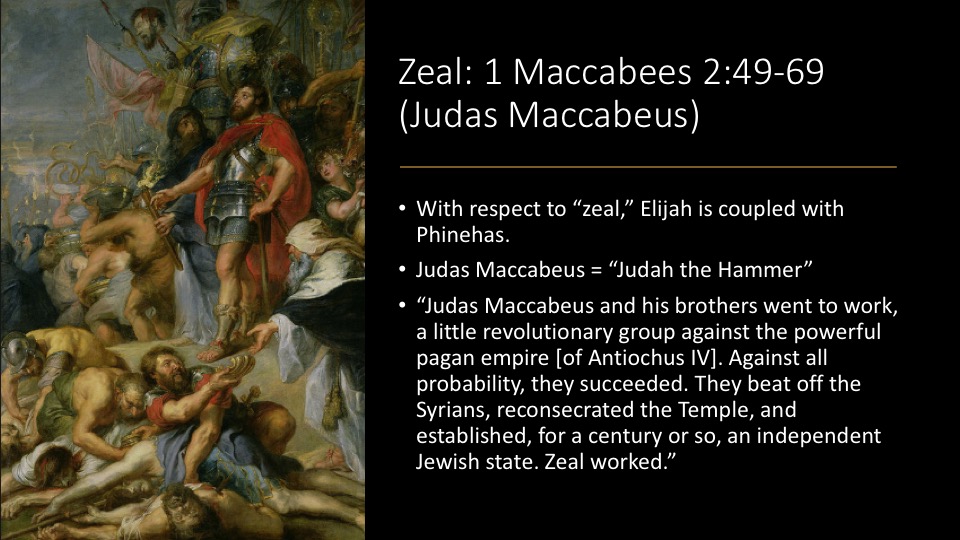
Paul A Biography [Scripture]
Zeal: 1 Maccabees 2:49-69 (Judas Maccabeus)
49 Now the days drew near for Mattathias to die, and he spoke to his sons: “Arrogance and contempt are present everywhere. It is a time of ruin and raging anger. 50 Now, my children, demonstrate zeal for the Law, and give your lives for our ancestors’ covenant.
51 “Remember the deeds of the ancestors, which they did in their day, and you will inherit great honor and everlasting remembrance.
52 Wasn’t Abraham found faithful when he was tested, and it was considered righteousness?53 Joseph kept the commandment in the time of his distress, and he became ruler of Egypt.54 Our ancestor Phinehas received the covenant of everlasting priesthood because he was deeply zealous.55 Joshua became a judge in Israel because he fulfilled the command.56 Caleb received an inheritance in the land because he testified in the assembly.57 David inherited the throne of the kingdom forever because he was merciful.58 Elijah was taken up into heaven because he had great zeal for the Law.59 Hananiah, Azariah, and Mishael believed, and were rescued from the flame.60 Daniel was delivered from the lions’ mouths because of his innocence.
61 “So you see that from generation to generation, no one who continues to trust God will lack strength. 62 Don’t fear the words of sinners, for their glory will turn into dung and worms. 63 Today they may be exalted, but tomorrow they can’t be found, because they will have returned to the dust and their plans will have vanished. 64 My children, show courage and grow strong in the Law, because this will bring you honor.
65 “Look, here is your brother Simon, who I know is a man with purpose. Always listen to him. He will be your father. 66 Judas Maccabeus has been a powerful fighter since he was a boy. He will command the army for you and lead the battle against the peoples. 67 Rally around yourselves all who observe the Law, and avenge wrong done to your people. 68 Pay the Gentiles back in full, and obey what the Law commands.”
69 Then he blessed them and joined his ancestors.
Wrights View
With respect to “zeal,” Elijah is coupled with Phinehas.
Judas Maccabeus = “Judah the Hammer”
“Judas Maccabeus and his brothers went to work, a little revolutionary group against the powerful pagan empire [of Antiochus IV]. Against all probability, they succeeded. They beat off the Syrians, reconsecrated the Temple, and established, for a century or so, an independent Jewish state. Zeal worked.”
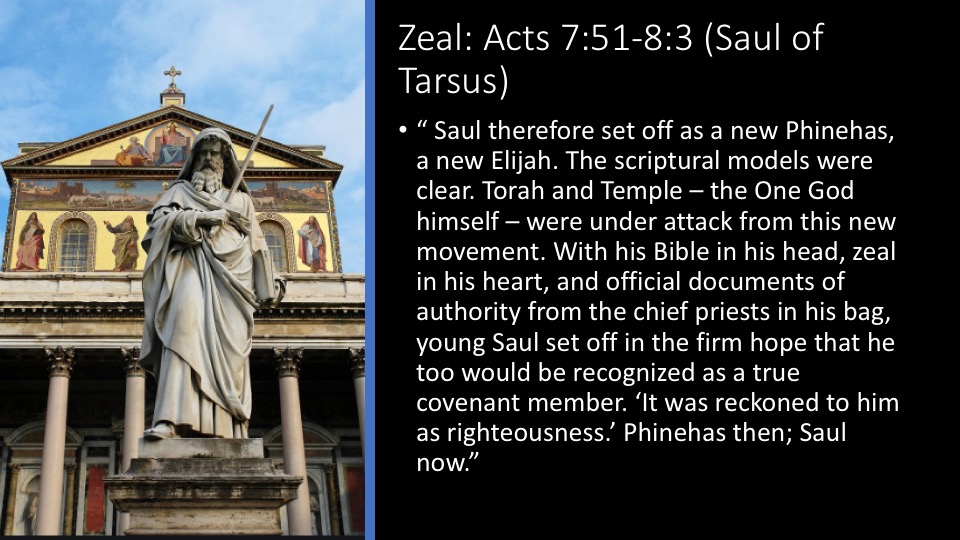
Paul A Biography [ Scripture ]
Zeal: Acts 7:51-8:3 (Saul of Tarsus)
7:51 “You stubborn people! In your thoughts and hearing, you are like those who have had no part in God’s covenant! You continuously set yourself against the Holy Spirit, just like your ancestors did. 52 Was there a single prophet your ancestors didn’t harass? They even killed those who predicted the coming of the righteous one, and you’ve betrayed and murdered him! 53 You received the Law given by angels, but you haven’t kept it.”
54 Once the council members heard these words, they were enraged and began to grind their teeth at Stephen. 55 But Stephen, enabled by the Holy Spirit, stared into heaven and saw God’s majesty and Jesus standing at God’s right side. 56 He exclaimed, “Look! I can see heaven on display and the Human One[a] standing at God’s right side!” 57 At this, they shrieked and covered their ears. Together, they charged at him, 58 threw him out of the city, and began to stone him. The witnesses placed their coats in the care of a young man named Saul. 59 As they battered him with stones, Stephen prayed, “Lord Jesus, accept my life!” 60 Falling to his knees, he shouted, “Lord, don’t hold this sin against them!” Then he died. 8:1 Saul was in full agreement with Stephen’s murder. At that time, the church in Jerusalem began to be subjected to vicious harassment. Everyone except the apostles was scattered throughout the regions of Judea and Samaria. 2 Some pious men buried Stephen and deeply grieved over him. 3 Saul began to wreak havoc against the church. Entering one house after another, he would drag off both men and women and throw them into prison.
Wright's View
“ Saul therefore set off as a new Phinehas, a new Elijah. The scriptural models were clear. Torah and Temple – the One God himself – were under attack from this new movement. With his Bible in his head, zeal in his heart, and official documents of authority from the chief priests in his bag, young Saul set off in the firm hope that he too would be recognized as a true covenant member. ‘It was reckoned to him as righteousness.’ Phinehas then; Saul now.”
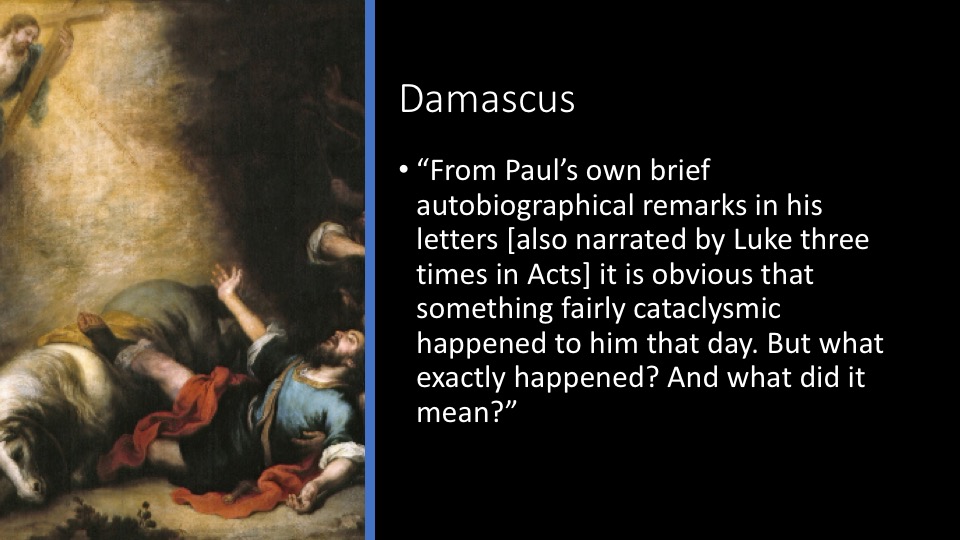
Wright's View
“From Paul’s own brief autobiographical remarks in his letters [also narrated by Luke three times in Acts] it is obvious that something fairly cataclysmic happened to him that day. But what exactly happened? And what did it mean?”
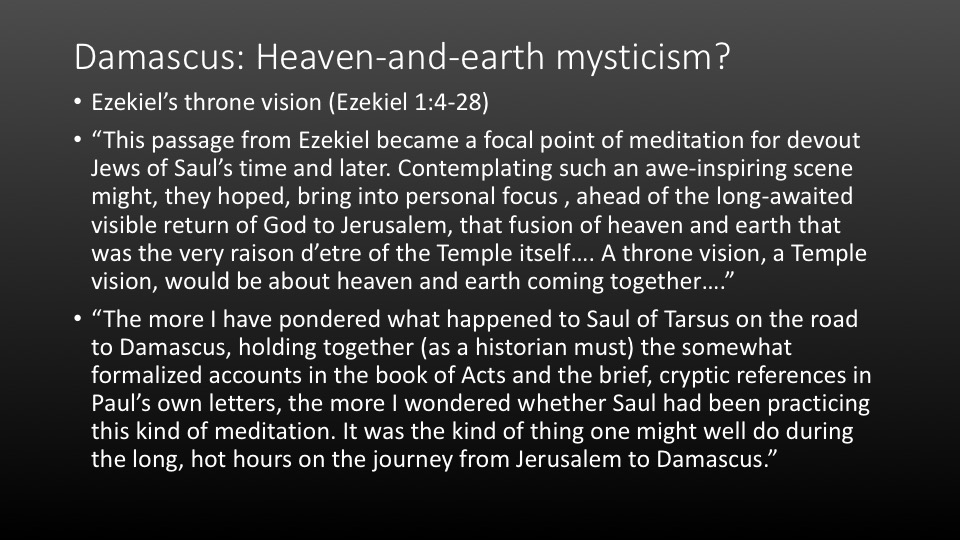
Paul A Biography [ Scripture ]
Damascus: Heaven-and-earth mysticism?
Ezekiel’s throne vision (Ezekiel 1:4-28)
4 As I watched, suddenly a driving storm came out of the north, a great cloud flashing fire, with brightness all around. At its center, in the middle of the fire, there was something like gleaming amber. 5 And inside that were forms of four living creatures. This was what they looked like: Each had the form of a human being, 6 though each had four faces and four wings. 7 Their feet looked like proper feet, but the soles of their feet were like calves’ hooves, and they shone like burnished bronze. 8 Human hands were under their wings on all four sides. All four creatures had faces and wings, and 9 their wings touched each other’s wings. When they moved, they each went straight ahead without turning. 10 As for the form of their faces: each of the four had a human face, with a lion’s face on the right and a bull’s face on the left, and also an eagle’s face. 11 The pairs of wings[a] that stretched out overhead touched each other, while the other pairs covered their bodies. 12 Each moved straight ahead wherever the wind propelled them; they moved without turning. 13 Regarding the creatures’ forms: they looked like blazing coals, like torches. Fire darted about between the creatures and illuminated them, and lightning flashed from the fire. 14 The creatures looked like lightning streaking back and forth.
15 As I looked at the creatures, suddenly there was a wheel on the earth corresponding to all four faces of the creatures. 16 The appearance and composition of the wheels were like sparkling topaz. There was one shape for all four of them, as if one wheel were inside another. 17 When they moved in any of the four directions, they moved without swerving. 18 Their rims were tall and terrifying, because all four of them were filled with eyes all around. 19 When the creatures moved, the wheels moved next to them. Whenever the creatures rose above the earth, the wheels also rose up. 20 Wherever the wind would appear to go, the wind would make them go there too. The wheels rose up beside them, because the spirit of the creatures was in the wheels. 21 When they moved, the wheels[c] moved; when they stood still, the wheels stood still; and when they rose above the earth, the wheels rose up along with them, because the spirit of the creatures was in the wheels.
22 The shape above the heads of the creatures was a dome; it was like glittering ice stretched out over their heads. 23 Just below the dome, their outstretched wings touched each other. They each also had two wings to cover their bodies. 24 Then I heard the sound of their wings when they moved forward. It was like the sound of mighty waters, like the sound of the Almighty, like the sound of tumult or the sound of an army camp. When they stood still, their wings came to rest. 25 Then there was a sound from above the dome over their heads. They stood still, and their wings came to rest.
26 Above the dome over their heads, there appeared something like lapis lazuli in the form of a throne. Above the form of the throne there was a form that looked like a human being. 27 Above what looked like his waist, I saw something like gleaming amber, something like fire enclosing it all around. Below what looked like his waist, I saw something that appeared to be fire. Its brightness shone all around. 28 Just as a rainbow lights up a cloud on a rainy day, so its brightness shone all around. This was how the form of the Lord’s glory appeared. When I saw it, I fell on my face. I heard the sound of someone speaking.
Footnotes:
“This passage from Ezekiel became a focal point of meditation for devout Jews of Saul’s time and later. Contemplating such an awe-inspiring scene might, they hoped, bring into personal focus , ahead of the long-awaited visible return of God to Jerusalem, that fusion of heaven and earth that was the very raison d’etre of the Temple itself…. A throne vision, a Temple vision, would be about heaven and earth coming together….”
“The more I have pondered what happened to Saul of Tarsus on the road to Damascus, holding together (as a historian must) the somewhat formalized accounts in the book of Acts and the brief, cryptic references in Paul’s own letters, the more I wondered whether Saul had been practicing this kind of meditation. It was the kind of thing one might well do during the long, hot hours on the journey from Jerusalem to Damascus.”
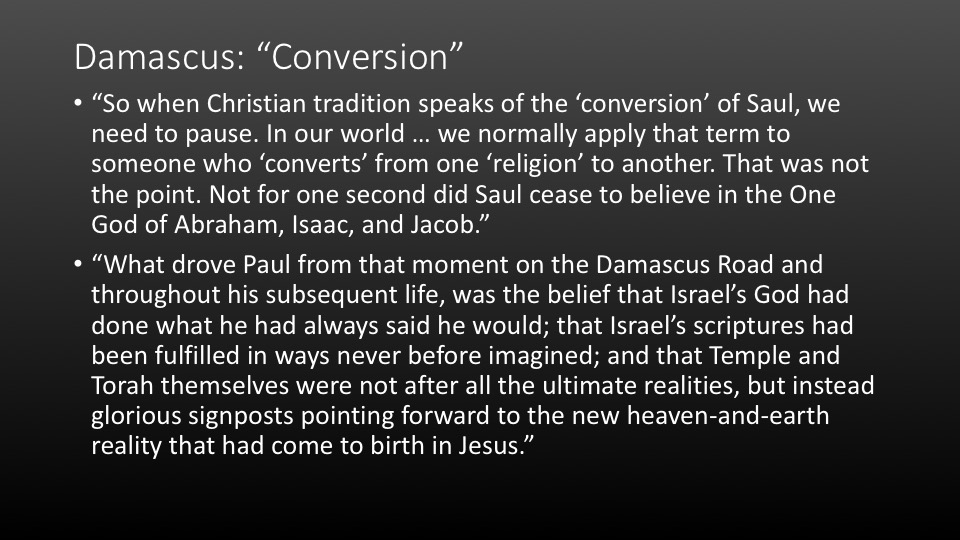
Wright's View
“So when Christian tradition speaks of the ‘conversion’ of Saul, we need to pause. In our world … we normally apply that term to someone who ‘converts’ from one ‘religion’ to another. That was not the point. Not for one second did Saul cease to believe in the One God of Abraham, Isaac, and Jacob.”
“What drove Paul from that moment on the Damascus Road and throughout his subsequent life, was the belief that Israel’s God had done what he had always said he would; that Israel’s scriptures had been fulfilled in ways never before imagined; and that Temple and Torah themselves were not after all the ultimate realities, but instead glorious signposts pointing forward to the new heaven-and-earth reality that had come to birth in Jesus.”
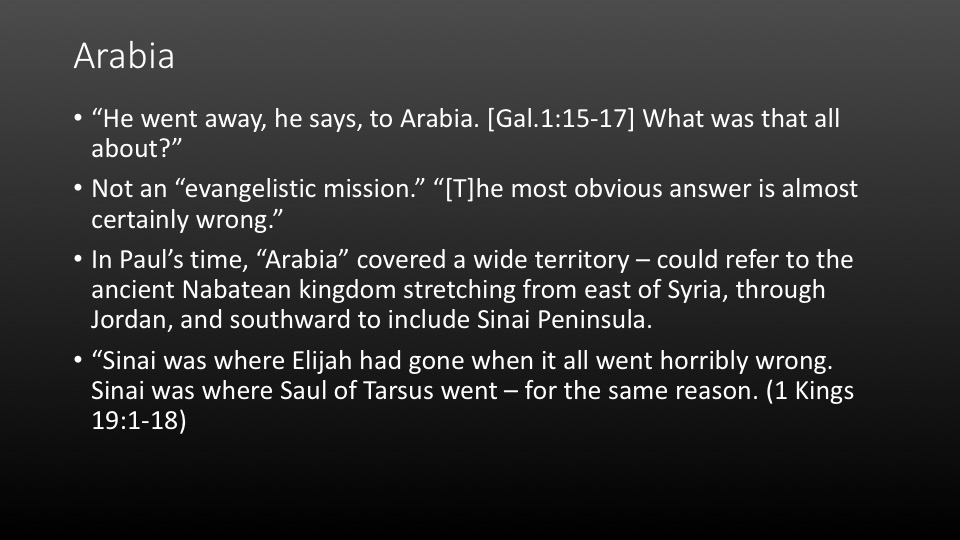
“He went away, he says, to Arabia. [Gal.1:15-17] What was that all about?”
Gal. 1:15 But God had set me apart from birth and called me through his grace. He was pleased 16 to reveal his Son to me, so that I might preach about him to the Gentiles. I didn’t immediately consult with any human being. 17 I didn’t go up to Jerusalem to see the men who were apostles before me either, but I went away into Arabia and I returned again to Damascus.
Not an “evangelistic mission.” "The most obvious answer is almost certainly wrong.”
In Paul’s time, “Arabia” covered a wide territory – could refer to the ancient Nabatean kingdom stretching from east of Syria, through Jordan, and southward to include Sinai Peninsula.
“Sinai was where Elijah had gone when it all went horribly wrong. Sinai was where Saul of Tarsus went – for the same reason. (1 Kings 19:1-18)
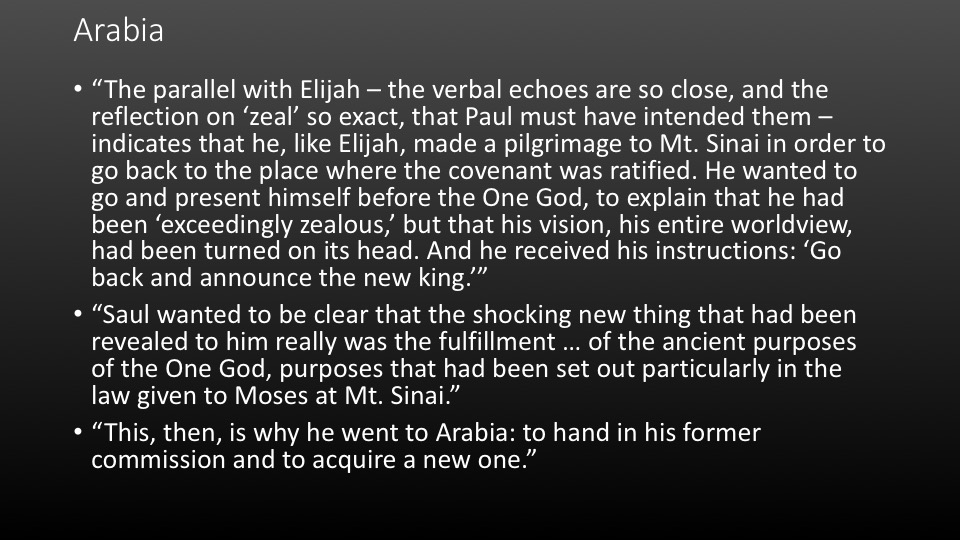
WRIGHTS VIEW
“The parallel with Elijah – the verbal echoes are so close, and the reflection on ‘zeal’ so exact, that Paul must have intended them – indicates that he, like Elijah, made a pilgrimage to Mt. Sinai in order to go back to the place where the covenant was ratified. He wanted to go and present himself before the One God, to explain that he had been ‘exceedingly zealous,’ but that his vision, his entire worldview, had been turned on its head. And he received his instructions: ‘Go back and announce the new king.’”
“Saul wanted to be clear that the shocking new thing that had been revealed to him really was the fulfillment … of the ancient purposes of the One God, purposes that had been set out particularly in the law given to Moses at Mt. Sinai.”
“This, then, is why he went to Arabia: to hand in his former commission and to acquire a new one.”
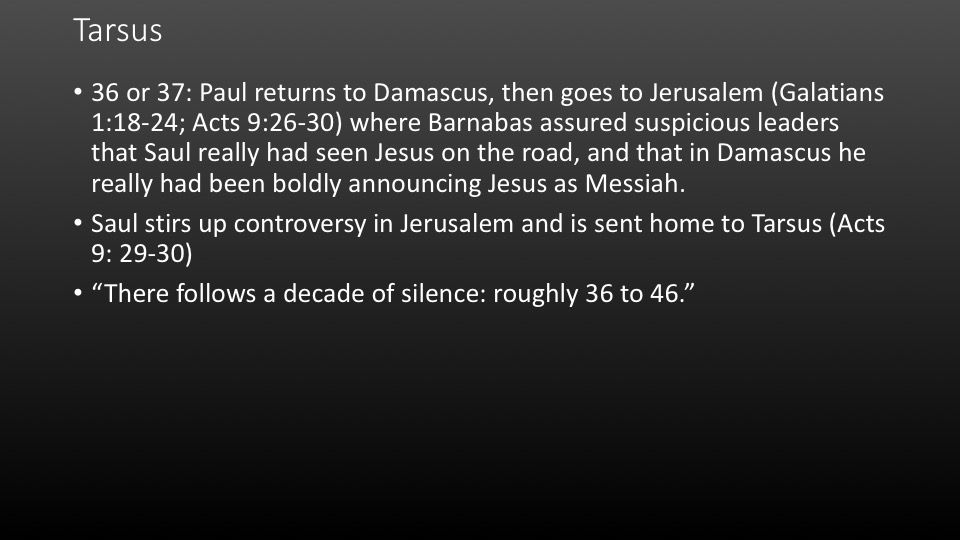
Paul A Biography [Scripture]
Galatians 1:18-24
18 Then after three years I went up to Jerusalem to visit Cephas and stayed with him fifteen days. 19 But I didn’t see any other of the apostles except James the brother of the Lord. 20 Before God, I’m not lying about the things that I’m writing to you! 21 Then I went into the regions of Syria and Cilicia, 22 but I wasn’t known personally by the Christian churches in Judea.23 They only heard a report about me: “The man who used to harass us now preaches the faith that he once tried to destroy.” 24 So they were glorifying God because of me.
Acts 9:26-30
26 When Saul arrived in Jerusalem, he tried to join the disciples, but they were all afraid of him. They didn’t believe he was really a disciple. 27 Then Barnabas brought Saul to the apostles and told them the story about how Saul saw the Lord on the way and that the Lord had spoken to Saul. He also told them about the confidence with which Saul had preached in the name of Jesus in Damascus.28 After this, Saul moved freely among the disciples in Jerusalem and was speaking with confidence in the name of the Lord. 29 He got into debates with the Greek-speaking Jews as well, but they tried to kill him. 30 When the family of believers learned about this, they escorted him down to Caesarea and sent him off to Tarsus.
Tarsus
36 or 37: Paul returns to Damascus, then goes to Jerusalem (Galatians 1:18-24; Acts 9:26-30) where Barnabas assured suspicious leaders that Saul really had seen Jesus on the road, and that in Damascus he really had been boldly announcing Jesus as Messiah.
Saul stirs up controversy in Jerusalem and is sent home to Tarsus (Acts 9: 29-30)
“There follows a decade of silence: roughly 36 to 46.”
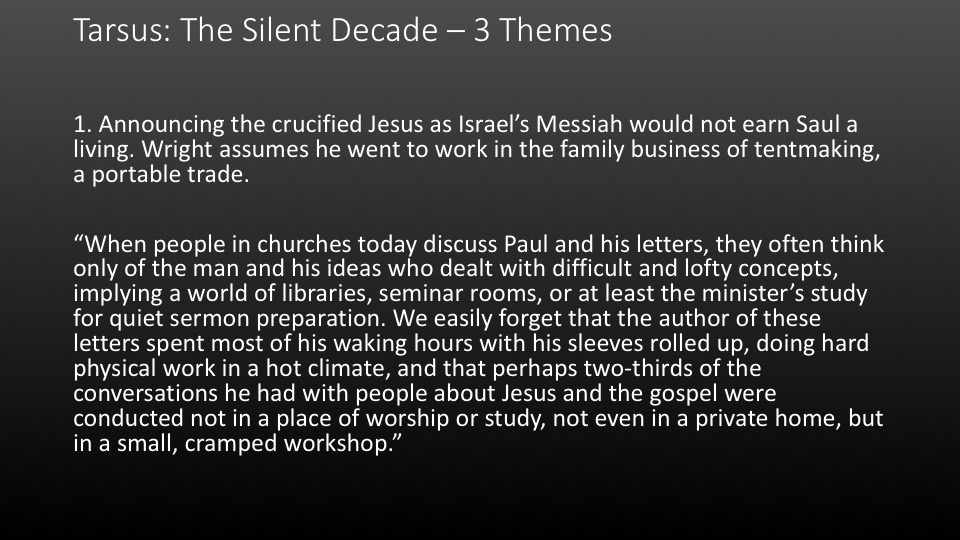
Tarsus: The Silent Decade – 3 Themes
Announcing the crucified Jesus as Israel’s Messiah would not earn Saul a living. Wright assumes he went to work in the family business of tent making, a portable trade.
“When people in churches today discuss Paul and his letters, they often think only of the man and his ideas who dealt with difficult and lofty concepts, implying a world of libraries, seminar rooms, or at least the minister’s study for quiet sermon preparation. We easily forget that the author of these letters spent most of his waking hours with his sleeves rolled up, doing hard physical work in a hot climate, and that perhaps two-thirds of the conversations he had with people about Jesus and the gospel were conducted not in a place of worship or study, not even in a private home, but in a small, cramped workshop.”
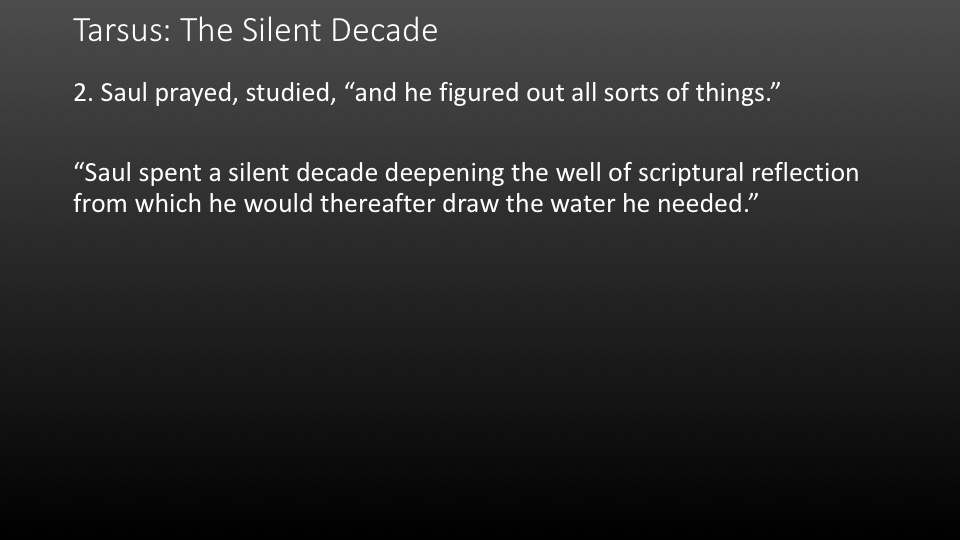
Tarsus: The Silent Decade
2. Saul prayed, studied, “and he figured out all sorts of things.”
“Saul spent a silent decade deepening the well of scriptural reflection from which he would thereafter draw the water he needed.”
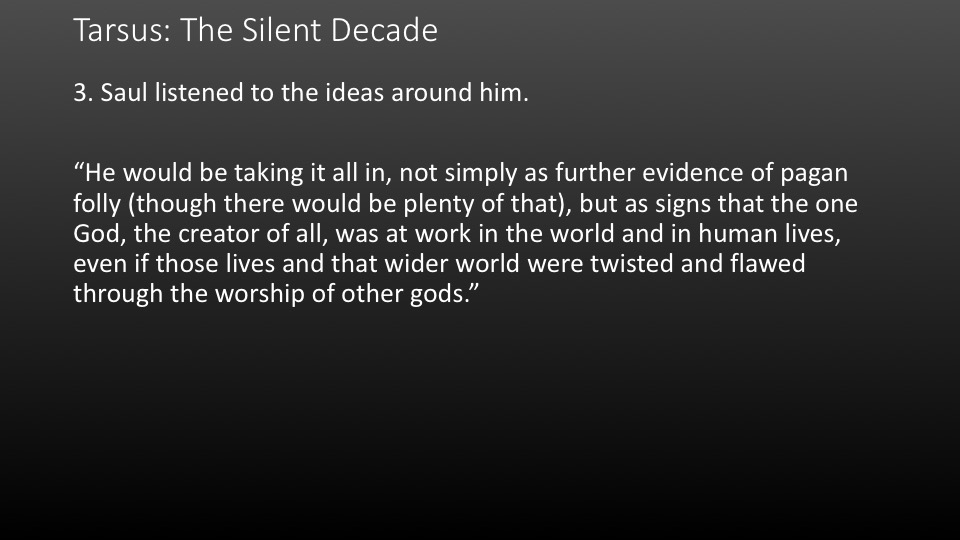
Tarsus: The Silent Decade
3. Saul listened to the ideas around him.
“He would be taking it all in, not simply as further evidence of pagan folly (though there would be plenty of that), but as signs that the one God, the creator of all, was at work in the world and in human lives, even if those lives and that wider world were twisted and flawed through the worship of other gods.”
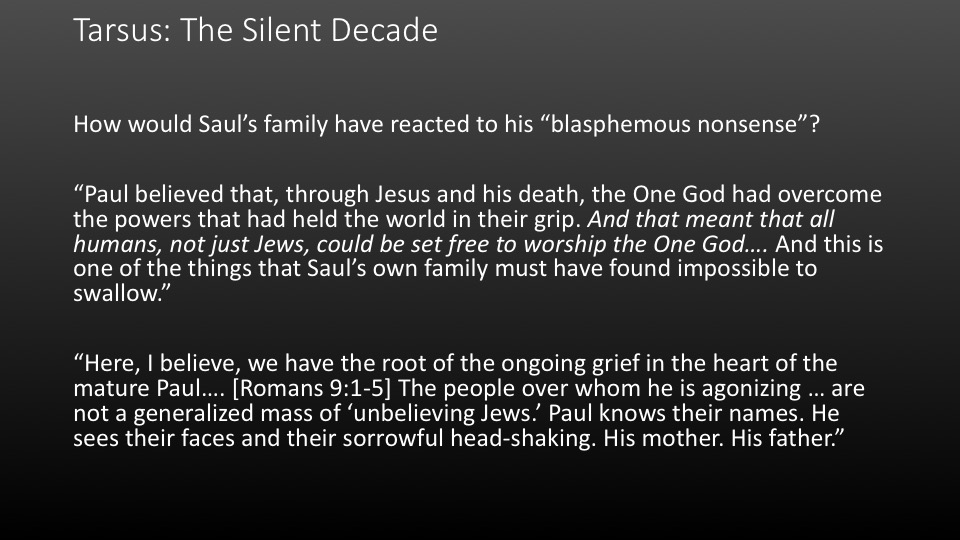
Paul A Biography [Scripture]
Romans 9:1-5
9:1 I’m speaking the truth in Christ—I’m not lying, as my conscience assures me with the Holy Spirit: 2 I have great sadness and constant pain in my heart. 3 I wish I could be cursed, cut off from Christ if it helped my brothers and sisters, who are my flesh-and-blood relatives. 4 They are Israelites. The adoption as God’s children, the glory, the covenants, the giving of the Law, the worship, and the promises belong to them. 5 The Jewish ancestors are theirs, and the Christ descended from those ancestors. He is the one who rules over all things, who is God, and who is blessed forever. Amen.
Tarsus: The Silent Decade
How would Saul’s family have reacted to his “blasphemous nonsense”?
“Paul believed that, through Jesus and his death, the One God had overcome the powers that had held the world in their grip. And that meant that all humans, not just Jews, could be set free to worship the One God…. And this is one of the things that Saul’s own family must have found impossible to swallow.”
“Here, I believe, we have the root of the ongoing grief in the heart of the mature Paul…. [Romans 9:1-5] The people over whom he is agonizing … are not a generalized mass of ‘unbelieving Jews.’ Paul knows their names. He sees their faces and their sorrowful head-shaking. His mother. His father.”
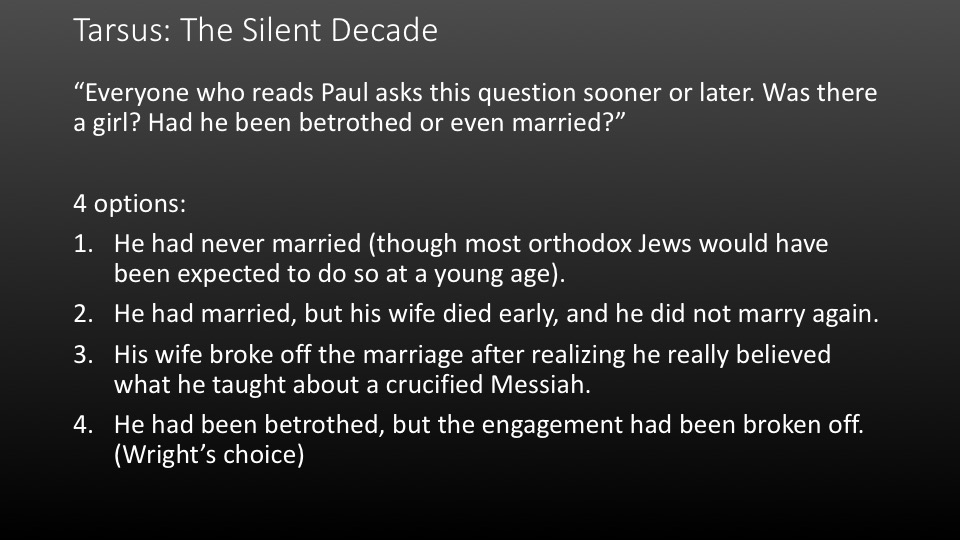
Tarsus: The Silent Decade
“Everyone who reads Paul asks this question sooner or later. Was there a girl? Had he been betrothed or even married?”
4 options:
1.He had never married (though most orthodox Jews would have been expected to do so at a young age).
2.He had married, but his wife died early, and he did not marry again.
3.His wife broke off the marriage after realizing he really believed what he taught about a crucified Messiah.
4.He had been betrothed, but the engagement had been broken off. (Wright’s choice)
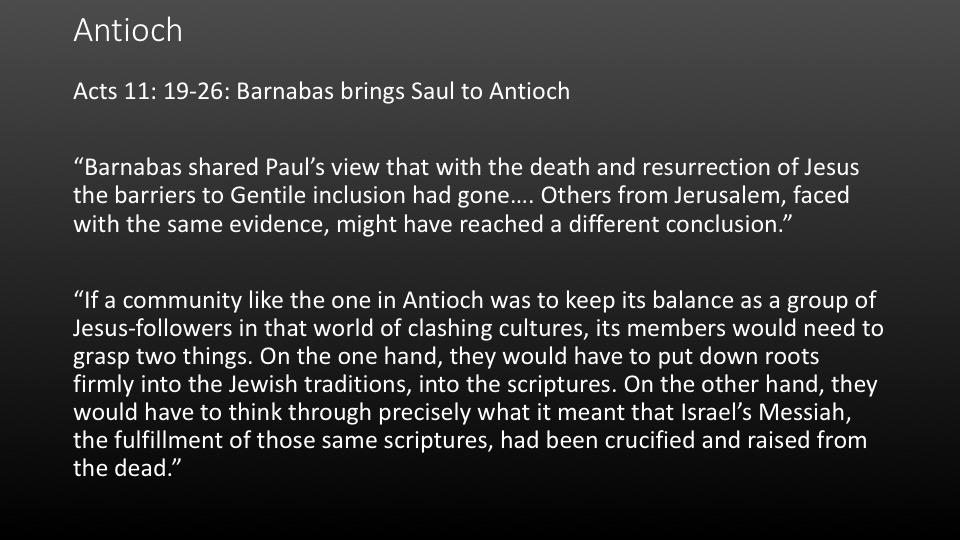
Paul A Biography [Scripture]
Acts 11:19-26
19 Now those who were scattered as a result of the trouble that occurred because of Stephen traveled as far as Phoenicia, Cyprus, and Antioch. They proclaimed the word only to Jews. 20 Among them were some people from Cyprus and Cyrene. They entered Antioch and began to proclaim the good news about the Lord Jesus also to Gentiles. 21 The Lord’s power was with them, and a large number came to believe and turned to the Lord.
22 When the church in Jerusalem heard about this, they sent Barnabas to Antioch.23 When he arrived and saw evidence of God’s grace, he was overjoyed and encouraged everyone to remain fully committed to the Lord. 24 Barnabas responded in this way because he was a good man, whom the Holy Spirit had endowed with exceptional faith. A considerable number of people were added to the Lord. 25 Barnabas went to Tarsus in search of Saul. 26 When he found him, he brought him to Antioch. They were there for a whole year, meeting with the church and teaching large numbers of people. It was in Antioch where the disciples were first labeled “Christians.”
Antioch
Acts 11: 19-26: Barnabas brings Saul to Antioch
“Barnabas shared Paul’s view that with the death and resurrection of Jesus the barriers to Gentile inclusion had gone…. Others from Jerusalem, faced with the same evidence, might have reached a different conclusion.”
“If a community like the one in Antioch was to keep its balance as a group of Jesus-followers in that world of clashing cultures, its members would need to grasp two things. On the one hand, they would have to put down roots firmly into the Jewish traditions, into the scriptures. On the other hand, they would have to think through precisely what it meant that Israel’s Messiah, the fulfillment of those same scriptures, had been crucified and raised from the dead.”
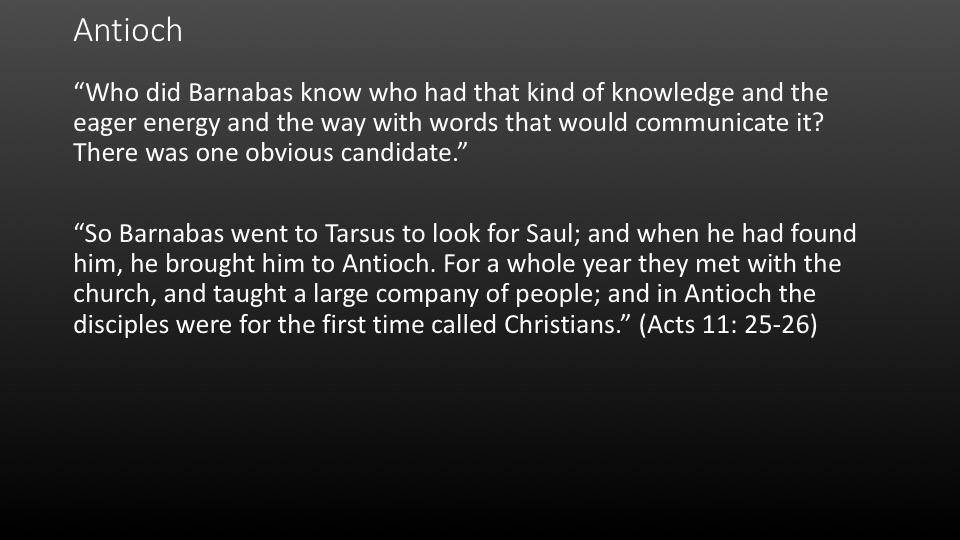
Antioch
“Who did Barnabas know who had that kind of knowledge and the eager energy and the way with words that would communicate it? There was one obvious candidate.”
“25 So Barnabas went to Tarsus to look for Saul; and 26 when he had found him, he brought him to Antioch. For a whole year they met with the church, and taught a large company of people; and in Antioch the disciples were for the first time called Christians.” (Acts 11: 25-26).
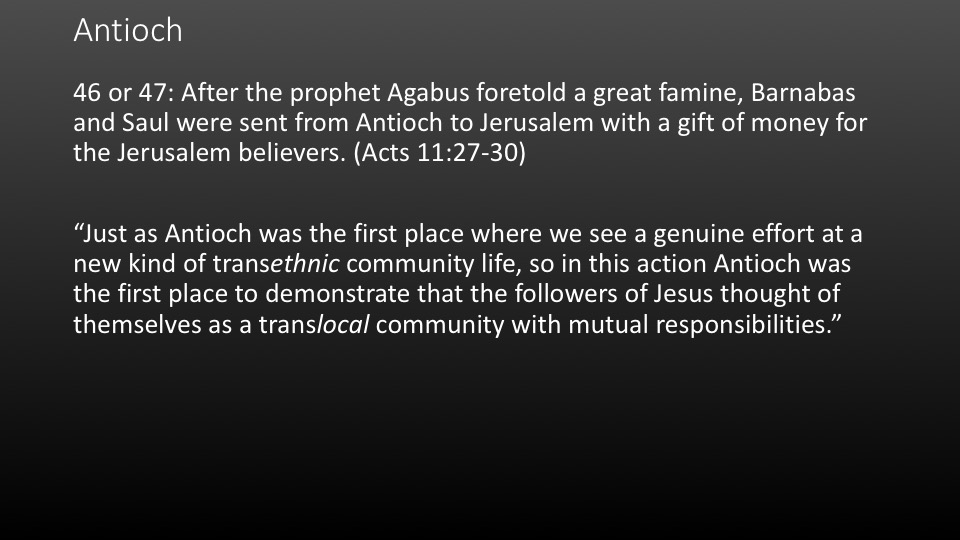
Paul A Biography [Scripture]
Acts 11:27-30
27 About that time, some prophets came down from Jerusalem to Antioch. 28 One of them, Agabus, stood up and, inspired by the Spirit, predicted that a severe famine would overtake the entire Roman world. (This occurred during Claudius’ rule.) 29 The disciples decided they would send support to the brothers and sisters in Judea, with everyone contributing to this ministry according to each person’s abundance. 30 They sent Barnabas and Saul to take this gift to the elders.
Antioch
46 or 47: After the prophet Agabus foretold a great famine, Barnabas and Saul were sent from Antioch to Jerusalem with a gift of money for the Jerusalem believers. (Acts 11:27-30)
“Just as Antioch was the first place where we see a genuine effort at a new kind of transethnic community life, so in this action Antioch was the first place to demonstrate that the followers of Jesus thought of themselves as a translocal community with mutual responsibilities.”
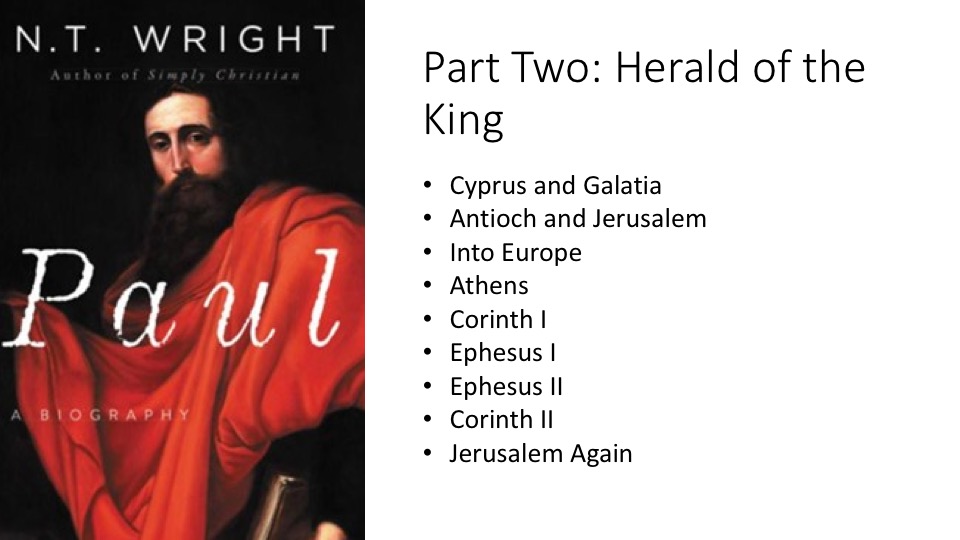
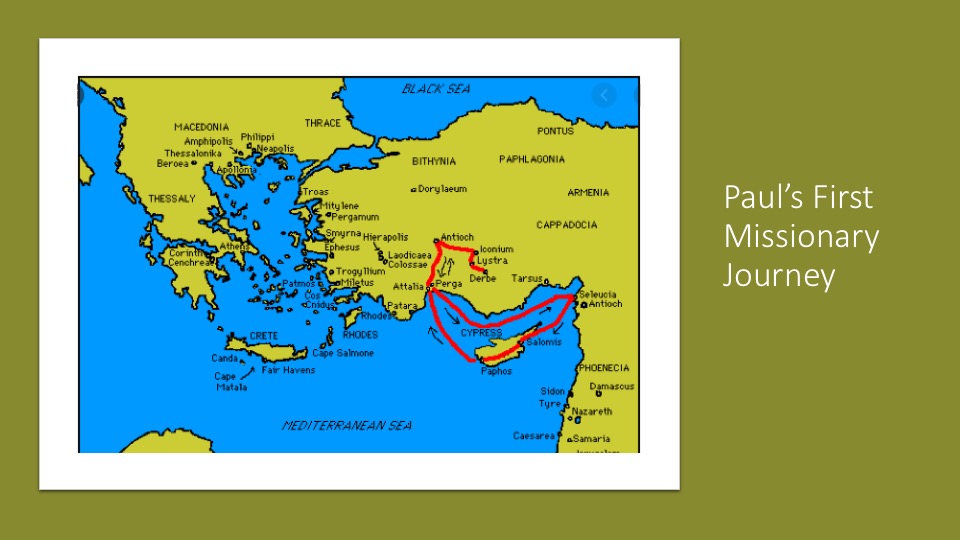
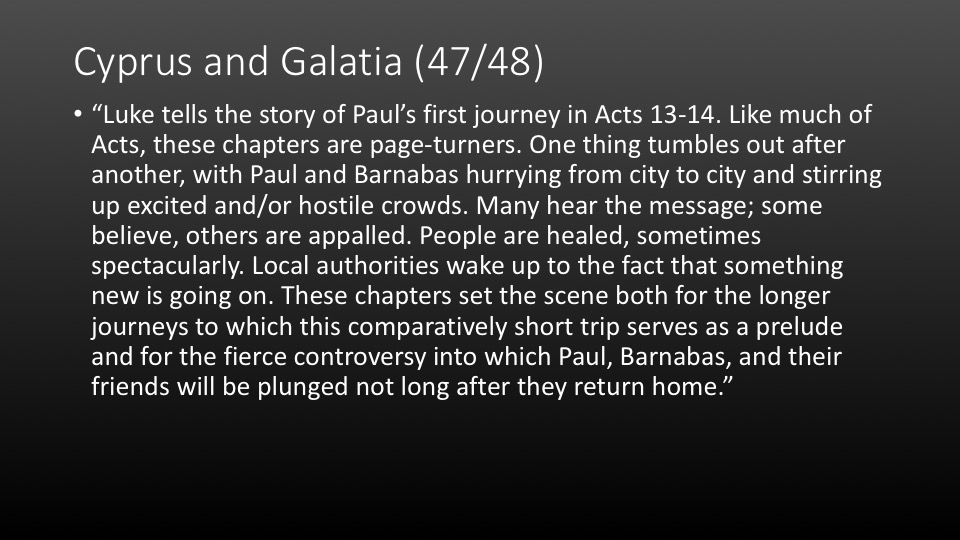
Cyprus and Galatia (47/48)
“Luke tells the story of Paul’s first journey in Acts 13-14. Like much of Acts, these chapters are page-turners. One thing tumbles out after another, with Paul and Barnabas hurrying from city to city and stirring up excited and/or hostile crowds. Many hear the message; some believe, others are appalled. People are healed, sometimes spectacularly. Local authorities wake up to the fact that something new is going on. These chapters set the scene both for the longer journeys to which this comparatively short trip serves as a prelude and for the fierce controversy into which Paul, Barnabas, and their friends will be plunged not long after they return home.”
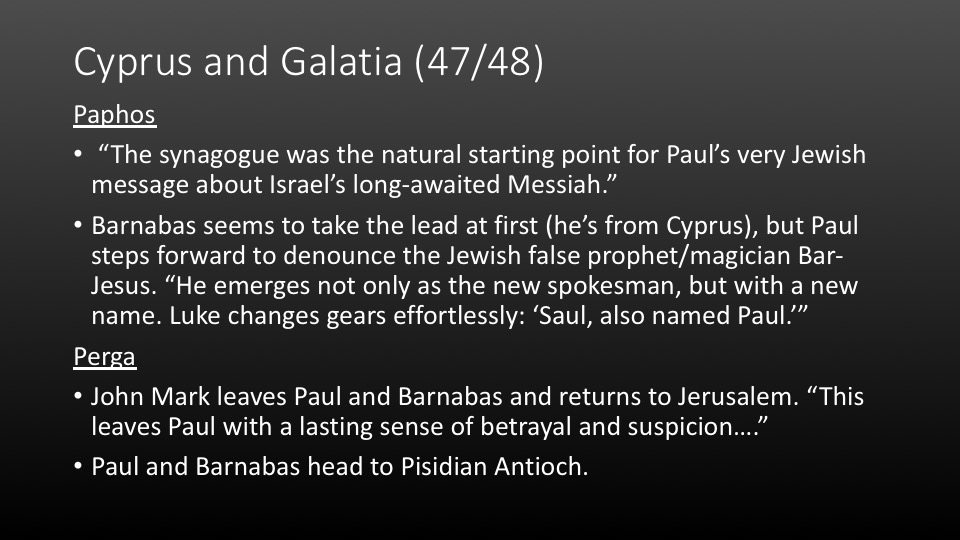
Cyprus and Galatia (47/48)
Paphos
“The synagogue was the natural starting point for Paul’s very Jewish message about Israel’s long-awaited Messiah.”
Barnabas seems to take the lead at first (he’s from Cyprus), but Paul steps forward to denounce the Jewish false prophet/magician Bar-Jesus. “He emerges not only as the new spokesman, but with a new name. Luke changes gears effortlessly: ‘Saul, also named Paul.’”
Perga
John Mark leaves Paul and Barnabas and returns to Jerusalem. “This leaves Paul with a lasting sense of betrayal and suspicion….”
Paul and Barnabas head to Pisidian Antioch.
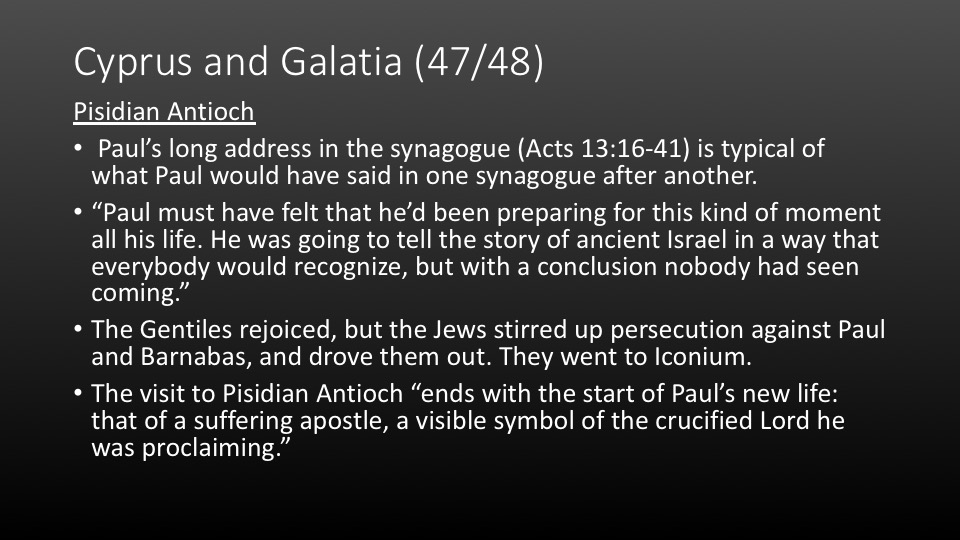
Paul A Biography [Scripture]
Acts 13:16-41
16 Standing up, Paul gestured with his hand and said, “Fellow Israelites and Gentile God-worshippers, please listen to me. 17 The God of this people Israel chose our ancestors. God made them a great people while they lived as strangers in the land of Egypt. With his great power, he led them out of that country. 18 For about forty years, God put up with them in the wilderness. 19 God conquered seven nations in the land of Canaan and gave the Israelites their land as an inheritance. 20 This happened over a period of about four hundred fifty years.
“After this, he gave them judges until the time of the prophet Samuel. 21 The Israelites requested a king, so God gave them Saul, Kish’s son, from the tribe of Benjamin, and he served as their king for forty years. 22 After God removed him, he raised up David to be their king. God testified concerning him, ‘I have found David, Jesse’s son, a man who shares my desires. Whatever my will is, he will do.’23 From this man’s descendants, God brought to Israel a savior, Jesus, just as he promised. 24 Before Jesus’ appearance, John proclaimed to all the Israelites a baptism to show they were changing their hearts and lives. 25 As John was completing his mission, he said, ‘Who do you think I am? I’m not the one you think I am, but he is coming after me. I’m not worthy to loosen his sandals.’
26 “Brothers, children of Abraham’s family, and you Gentile God-worshippers, the message about this salvation has been sent to us. 27 The people in Jerusalem and their leaders didn’t recognize Jesus. By condemning him they fulfilled the words of the prophets that are read every Sabbath. 28 Even though they didn’t find a single legal basis for the death penalty, they asked Pilate to have him executed. 29 When they finished doing everything that had been written about him, they took him down from the cross and laid him in a tomb. 30 But God raised him from the dead! 31 He appeared over many days to those who had traveled with him from Galilee to Jerusalem. They are now his witnesses to the people.
32 “We proclaim to you the good news. What God promised to our ancestors, 33 he has fulfilled for us, their children, by raising up Jesus. As it was written in the second psalm, You are my son; today I have become your father.
34 “God raised Jesus from the dead, never again to be subjected to death’s decay. Therefore, God said, I will give to you the holy and firm promises I made to David. 35 In another place it is said, You will not let your holy one experience death’s decay.[e] 36 David served God’s purpose in his own generation, then he died and was buried with his ancestors. He experienced death’s decay, 37 but the one whom God has raised up didn’t experience death’s decay.
38 “Therefore, brothers and sisters, know this: Through Jesus we proclaim forgiveness of sins to you. From all those sins from which you couldn’t be put in right relationship with God through Moses’ Law, 39 through Jesus everyone who believes is put in right relationship with God. 40 Take care that the prophets’ words don’t apply to you:
41 Look, you scoffers,
marvel and die.
I’m going to do work in your day —
a work you won’t believe
even if someone told you.”[f]
Cyprus and Galatia (47/48)
Pisidian Antioch
Paul’s long address in the synagogue (Acts 13:16-41) is typical of what Paul would have said in one synagogue after another.
“Paul must have felt that he’d been preparing for this kind of moment all his life. He was going to tell the story of ancient Israel in a way that everybody would recognize, but with a conclusion nobody had seen coming.”
The Gentiles rejoiced, but the Jews stirred up persecution against Paul and Barnabas, and drove them out. They went to Iconium.
The visit to Pisidian Antioch “ends with the start of Paul’s new life: that of a suffering apostle, a visible symbol of the crucified Lord he was proclaiming.”
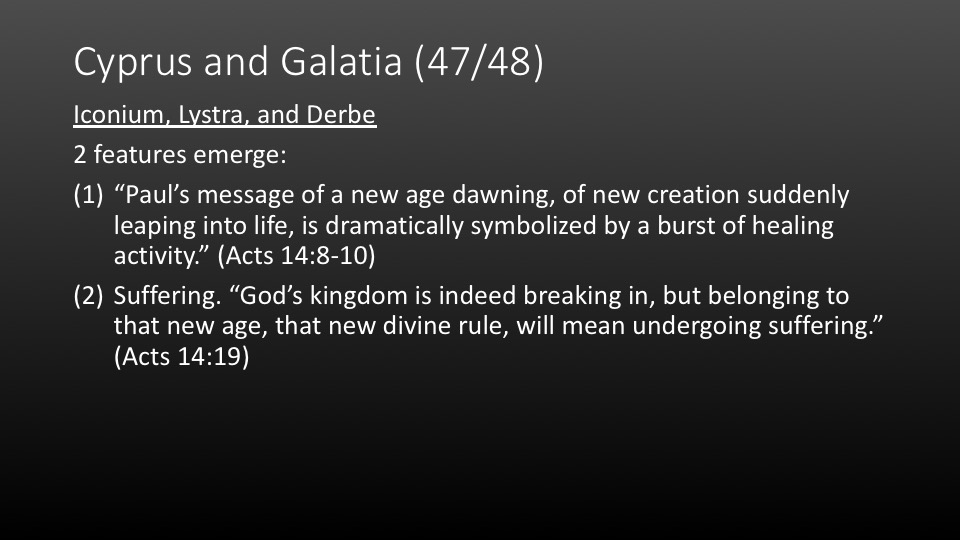
Paul A Biography [Scripture}
Acts 14:8-10
8 In Lystra there was a certain man who lacked strength in his legs. He had been crippled since birth and had never walked. Sitting there, he 9 heard Paul speaking. Paul stared at him and saw that he believed he could be healed.
10 Raising his voice, Paul said, “Stand up straight on your feet!” He jumped up and began to walk.
Acts 14:19
19 Jews from Antioch and Iconium arrived and won the crowds over. They stoned Paul and dragged him out of the city, supposing he was dead.
Cyprus and Galatia (47/48)
Iconium, Lystra, and Derbe
2 features emerge:
(1) “Paul’s message of a new age dawning, of new creation suddenly leaping into life, is dramatically symbolized by a burst of healing activity.” (Acts 14:8-10)
(2) Suffering. “God’s kingdom is indeed breaking in, but belonging to that new age, that new divine rule, will mean undergoing suffering.” (Acts 14:19)
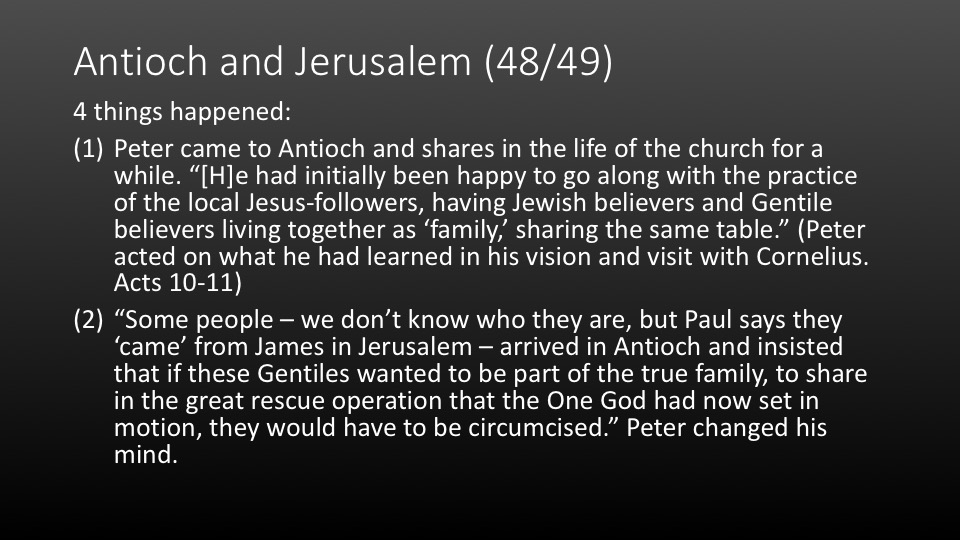
Antioch and Jerusalem (48/49)
4 things happened:
(1) Peter came to Antioch and shares in the life of the church for a while. “[H]e had initially been happy to go along with the practice of the local Jesus-followers, having Jewish believers and Gentile believers living together as ‘family,’ sharing the same table.” (Peter acted on what he had learned in his vision and visit with Cornelius. Acts 10-11)
(2)“Some people – we don’t know who they are, but Paul says they ‘came’ from James in Jerusalem – arrived in Antioch and insisted that if these Gentiles wanted to be part of the true family, to share in the great rescue operation that the One God had now set in motion, they would have to be circumcised.” Peter changed his mind.
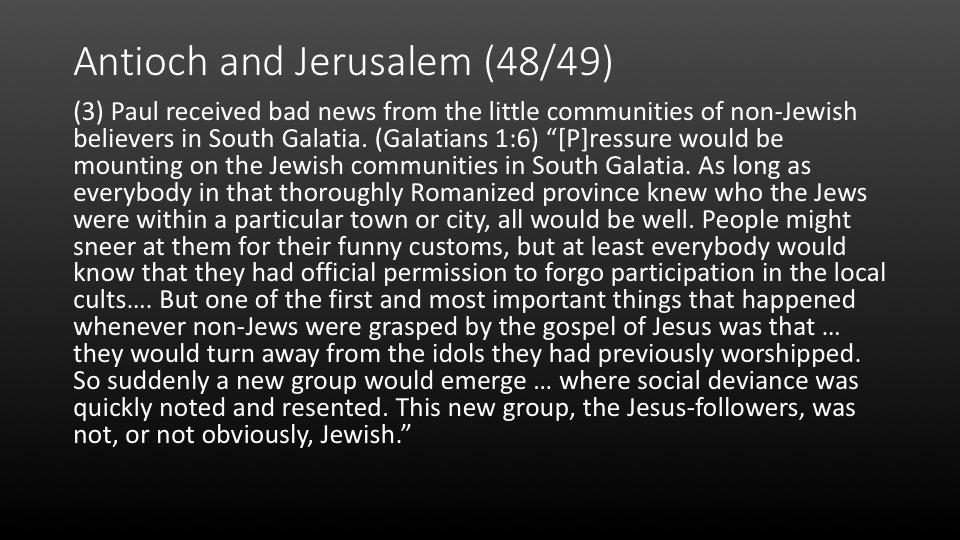
Paul A Biography [Scripture]
Galatians 1:6
6 I’m amazed that you are so quickly deserting the one who called you by the grace of Christ to follow another gospel.
Antioch and Jerusalem (48/49)
(3) Paul received bad news from the little communities of non-Jewish believers in South Galatia. (Galatians 1:6) “[P]ressure would be mounting on the Jewish communities in South Galatia. As long as everybody in that thoroughly Romanized province knew who the Jews were within a particular town or city, all would be well. People might sneer at them for their funny customs, but at least everybody would know that they had official permission to forgo participation in the local cults…. But one of the first and most important things that happened whenever non-Jews were grasped by the gospel of Jesus was that … they would turn away from the idols they had previously worshipped. So suddenly a new group would emerge … where social deviance was quickly noted and resented. This new group, the Jesus-followers, was not, or not obviously, Jewish.”
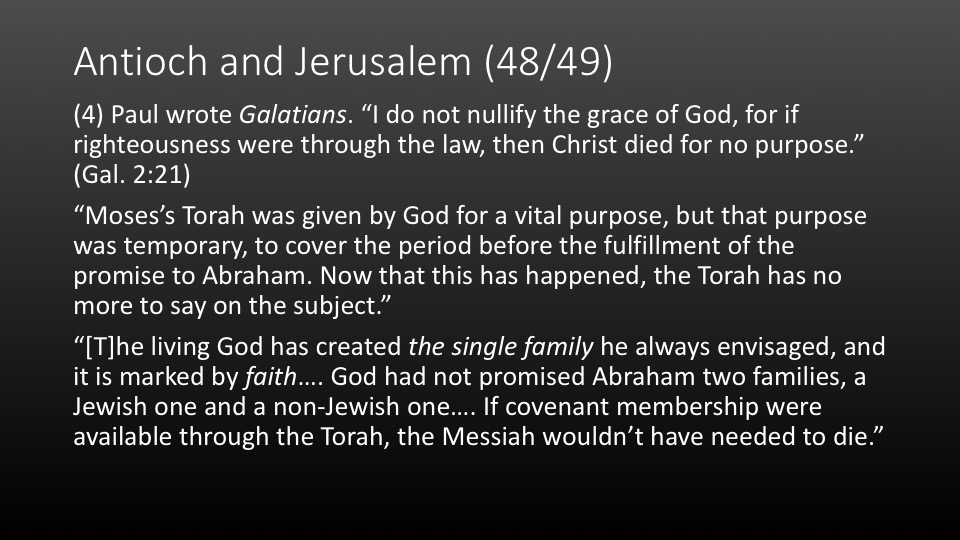
Antioch and Jerusalem (48/49)
(4) Paul wrote Galatians. “I do not nullify the grace of God, for if righteousness were through the law, then Christ died for no purpose.” (Gal. 2:21)
“Moses’s Torah was given by God for a vital purpose, but that purpose was temporary, to cover the period before the fulfillment of the promise to Abraham. Now that this has happened, the Torah has no more to say on the subject.”
“[T]he living God has created the single family he always envisaged, and it is marked by faith…. God had not promised Abraham two families, a Jewish one and a non-Jewish one…. If covenant membership were available through the Torah, the Messiah wouldn’t have needed to die.”
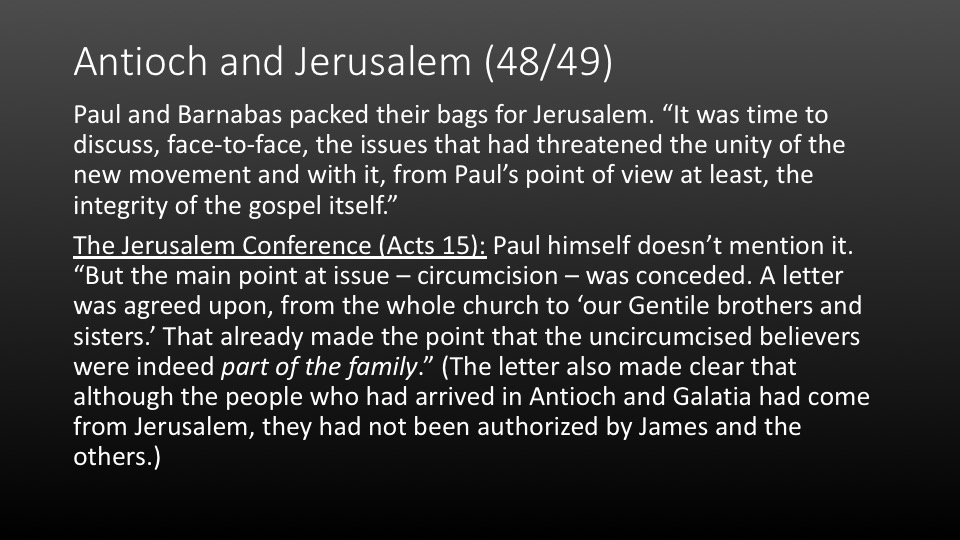
Antioch and Jerusalem (48/49)
Paul and Barnabas packed their bags for Jerusalem. “It was time to discuss, face-to-face, the issues that had threatened the unity of the new movement and with it, from Paul’s point of view at least, the integrity of the gospel itself.”
The Jerusalem Conference (Acts 15): Paul himself doesn’t mention it. “But the main point at issue – circumcision – was conceded. A letter was agreed upon, from the whole church to ‘our Gentile brothers and sisters.’ That already made the point that the uncircumcised believers were indeed part of the family.” (The letter also made clear that although the people who had arrived in Antioch and Galatia had come from Jerusalem, they had not been authorized by James and the others.)
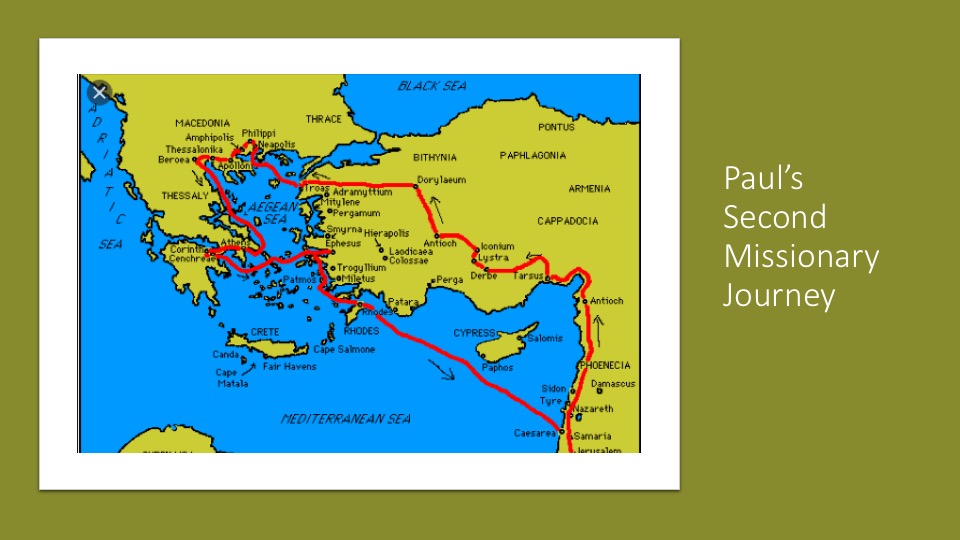
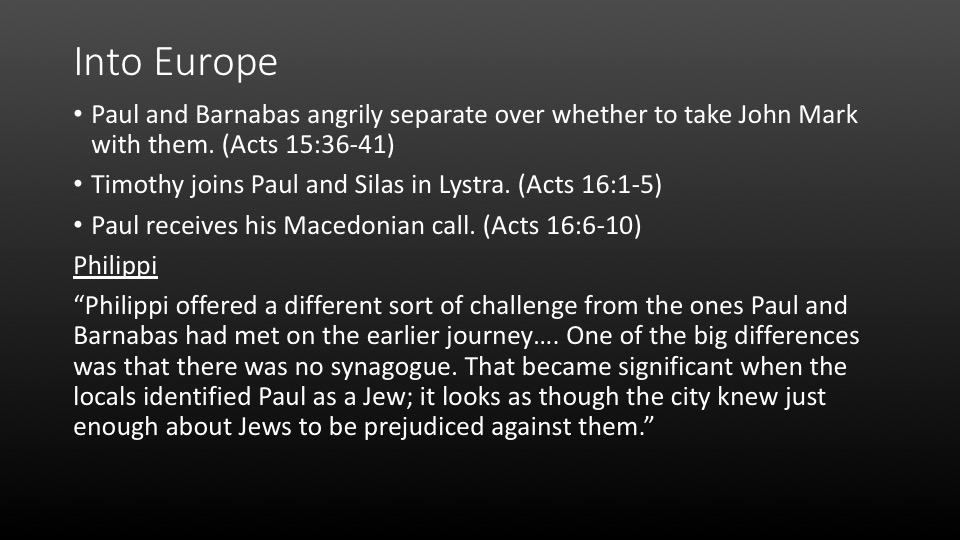
Paul A Biography [Scripture]
Acts 15:36-41
36 Some time later, Paul said to Barnabas, “Let’s go back and visit all the brothers and sisters in every city where we preached the Lord’s word. Let’s see how they are doing.” 37 Barnabas wanted to take John Mark with them. 38 Paul insisted that they shouldn’t take him along, since he had deserted them in Pamphylia and hadn’t continued with them in their work. 39 Their argument became so intense that they went their separate ways. Barnabas took Mark and sailed to Cyprus.40 Paul chose Silas and left, entrusted by the brothers and sisters to the Lord’s grace. 41 He traveled through Syria and Cilicia, strengthening the churches.
Acts 16:1-5
1 Paul reached Derbe, and then Lystra, where there was a disciple named Timothy. He was the son of a believing Jewish woman and a Greek father. 2 The brothers and sisters in Lystra and Iconium spoke well of him. 3 Paul wanted to take Timothy with him, so he circumcised him. This was because of the Jews who lived in those areas, for they all knew Timothy’s father was Greek. 4 As Paul and his companions traveled through the cities, they instructed Gentile believers to keep the regulations put in place by the apostles and elders in Jerusalem. 5 So the churches were strengthened in the faith and every day their numbers flourished.
Acts 16:6-10
6 Paul and his companions traveled throughout the regions of Phrygia and Galatia because the Holy Spirit kept them from speaking the word in the province of Asia.7 When they approached the province of Mysia, they tried to enter the province of Bithynia, but the Spirit of Jesus wouldn’t let them. 8 Passing by Mysia, they went down to Troas instead. 9 A vision of a man from Macedonia came to Paul during the night. He stood urging Paul, “Come over to Macedonia and help us!”10 Immediately after he saw the vision, we prepared to leave for the province of Macedonia, concluding that God had called us to proclaim the good news to them.
Into Europe
Paul and Barnabas angrily separate over whether to take John Mark with them. (Acts 15:36-41)
Timothy joins Paul and Silas in Lystra. (Acts 16:1-5)
Paul receives his Macedonian call. (Acts 16:6-10)
Philippi
“Philippi offered a different sort of challenge from the ones Paul and Barnabas had met on the earlier journey…. One of the big differences was that there was no synagogue. That became significant when the locals identified Paul as a Jew; it looks as though the city knew just enough about Jews to be prejudiced against them.”
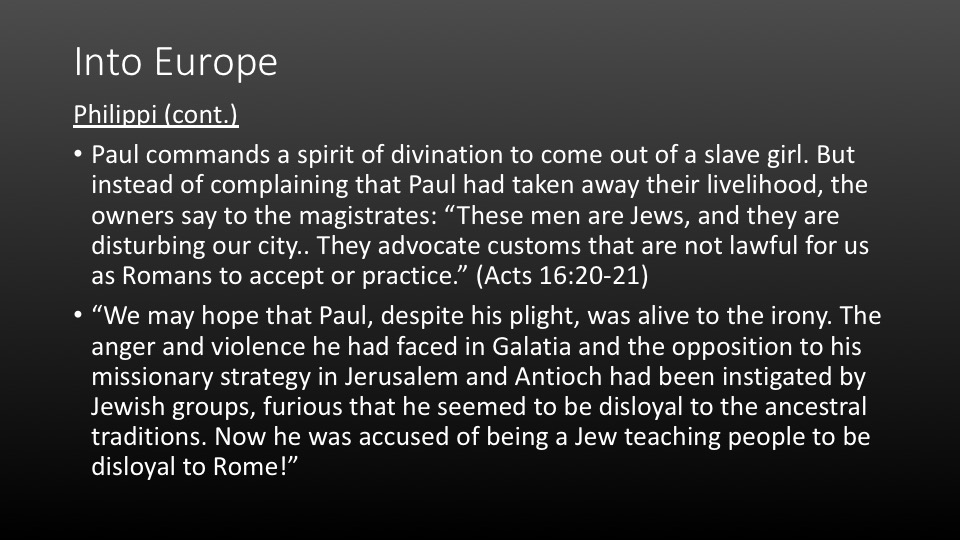
Paul A Biography [Scripture]
Acts 16:20-21
20 When her owners approached the legal authorities, they said, “These people are causing an uproar in our city. They are Jews 21 who promote customs that we Romans can’t accept or practice.”
Into Europe
Philippi (cont.)
Paul commands a spirit of divination to come out of a slave girl. But instead of complaining that Paul had taken away their livelihood, the owners say to the magistrates: “These men are Jews, and they are disturbing our city.. They advocate customs that are not lawful for us as Romans to accept or practice.” (Acts 16:20-21)
“We may hope that Paul, despite his plight, was alive to the irony. The anger and violence he had faced in Galatia and the opposition to his missionary strategy in Jerusalem and Antioch had been instigated by Jewish groups, furious that he seemed to be disloyal to the ancestral traditions. Now he was accused of being a Jew teaching people to be disloyal to Rome!”
Paul A Biography [Scripture]
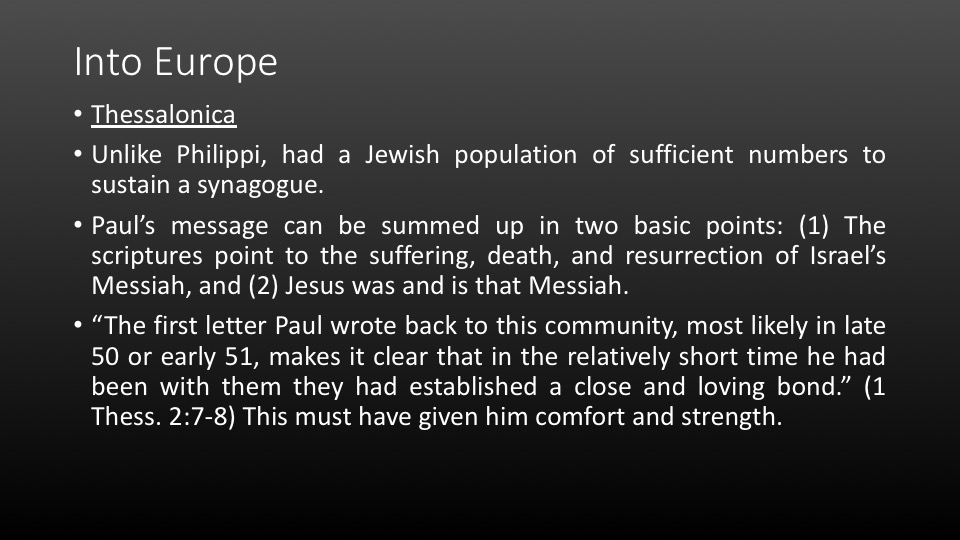
1 Thessalonians 2:7-8
7 Although we could have thrown our weight around as Christ’s apostles. Instead, we were gentle with you like a nursing mother caring for her own children. 8 We were glad to share not only God’s good news with you but also our very lives because we cared for you so much.
Into Europe
Thessalonica
Unlike Philippi, had a Jewish population of sufficient numbers to sustain a synagogue.
Paul’s message can be summed up in two basic points: (1) The scriptures point to the suffering, death, and resurrection of Israel’s Messiah, and (2) Jesus was and is that Messiah.
“The first letter Paul wrote back to this community, most likely in late 50 or early 51, makes it clear that in the relatively short time he had been with them they had established a close and loving bond.” (1 Thess. 2:7-8) This must have given him comfort and strength.
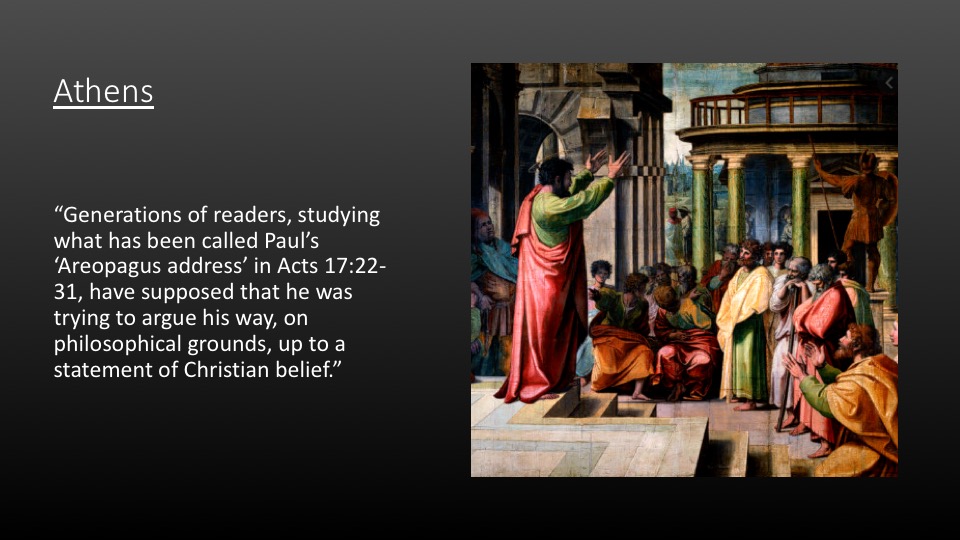
Paul A Biography [Scripture]
Acts 17:6-7
6 When they didn’t find them, they dragged Jason and some believers before the city officials. They were shouting, “These people who have been disturbing the peace throughout the empire have also come here. 7 What is more, Jason has welcomed them into his home. Every one of them does what is contrary to Caesar’s decrees by naming someone else as king: Jesus.”
Acts 17:11
11 The Beroean Jews were more honorable than those in Thessalonica. This was evident in the great eagerness with which they accepted the word and examined the scriptures each day to see whether Paul and Silas’ teaching was true.
Into Europe
Berea
Paul and Silas smuggled out of Thessalonica by night after being accused of “acting against the decrees of Caesar, saying that there is another king, Jesus.” (Acts 17:6-7) A good beginning in Berea (“these Jews were more noble than those in Thessalonica; they received the word with eagerness….” Acts 17:11) But it did not last. The troublemakers from Thessalonica came after him.
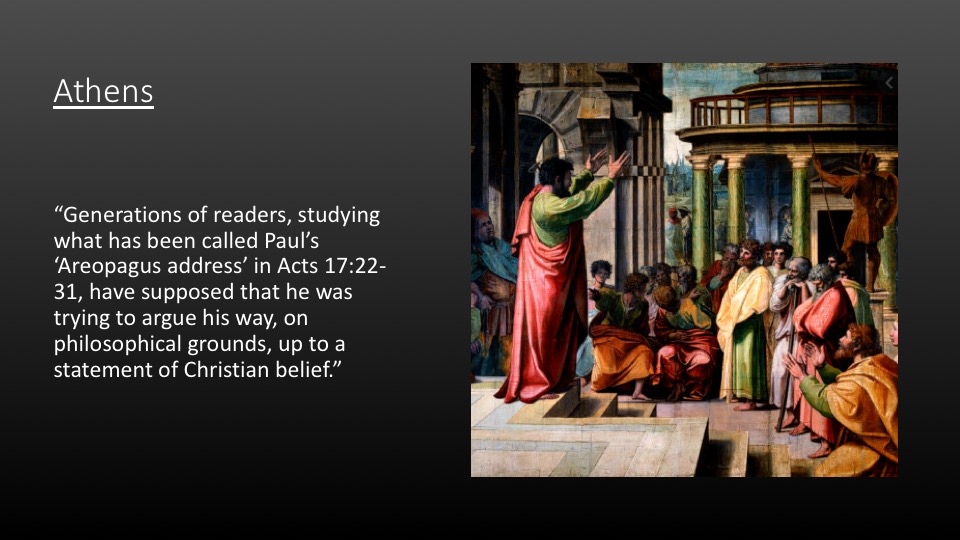
Paul A Biography [Scripture]
Acts 17:22-31
22 Paul stood up in the middle of the council on Mars Hill and said, “People of Athens, I see that you are very religious in every way. 23 As I was walking through town and carefully observing your objects of worship, I even found an altar with this inscription: ‘To an unknown God.’ What you worship as unknown, I now proclaim to you. 24 God, who made the world and everything in it, is Lord of heaven and earth. He doesn’t live in temples made with human hands. 25 Nor is God served by human hands, as though he needed something, since he is the one who gives life, breath, and everything else. 26 From one person God created every human nation to live on the whole earth, having determined their appointed times and the boundaries of their lands. 27 God made the nations so they would seek him, perhaps even reach out to him and find him. In fact, God isn’t far away from any of us. 28 In God we live, move, and exist. As some of your own poets said, ‘We are his offspring.’
29 “Therefore, as God’s offspring, we have no need to imagine that the divine being is like a gold, silver, or stone image made by human skill and thought. 30 God overlooks ignorance of these things in times past, but now directs everyone everywhere to change their hearts and lives. 31 This is because God has set a day when he intends to judge the world justly by a man he has appointed. God has given proof of this to everyone by raising him from the dead.”
Athens
“Generations of readers, studying what has been called Paul’s ‘Areopagus address’ in Acts 17:22-31, have supposed that he was trying to argue his way, on philosophical grounds, up to a statement of Christian belief.”
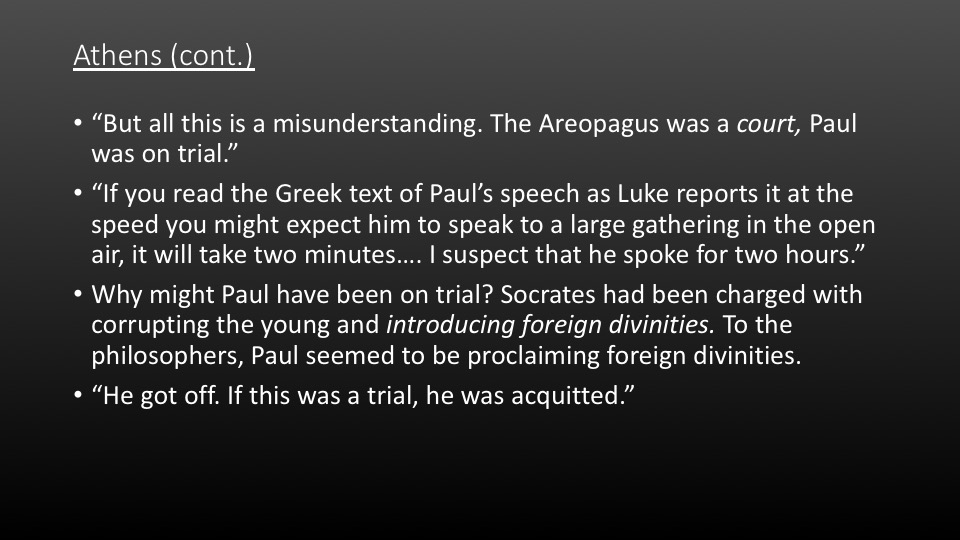
Into Europe
Athens (cont.)
“But all this is a misunderstanding. The Areopagus was a court, Paul was on trial.”
“If you read the Greek text of Paul’s speech as Luke reports it at the speed you might expect him to speak to a large gathering in the open air, it will take two minutes…. I suspect that he spoke for two hours.”
Why might Paul have been on trial? Socrates had been charged with corrupting the young and introducing foreign divinities. To the philosophers, Paul seemed to be proclaiming foreign divinities.
“He got off. If this was a trial, he was acquitted.”
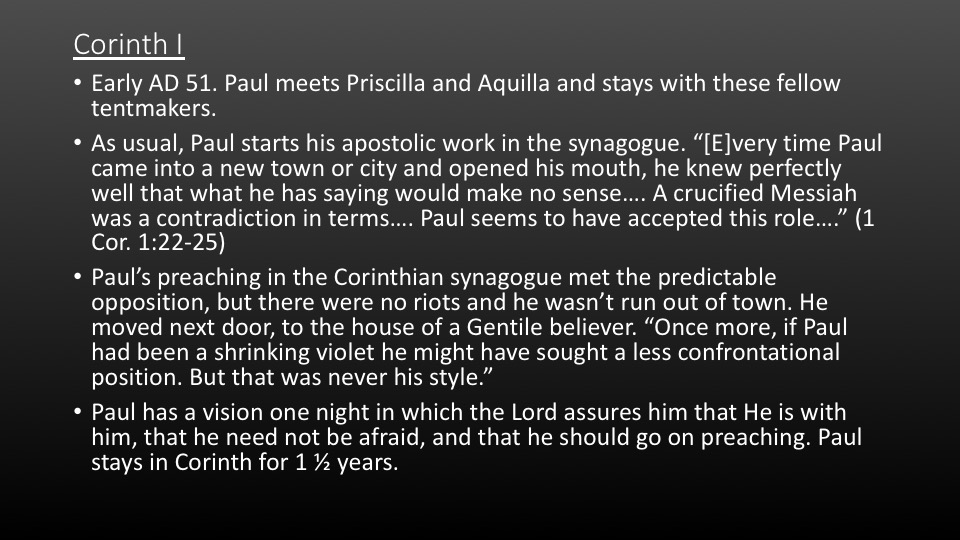
Paul A Biography [Scripture]
1 Corinthians 1:22-25
22 Jews ask for signs, and Greeks look for wisdom, 23 but we preach Christ crucified, which is a scandal to Jews and foolishness to Gentiles. 24 But to those who are called—both Jews and Greeks—Christ is God’s power and God’s wisdom. 25 This is because the foolishness of God is wiser than human wisdom, and the weakness of God is stronger than human strength.
Corinth I
Early AD 51. Paul meets Priscilla and Aquilla and stays with these fellow tentmakers.
As usual, Paul starts his apostolic work in the synagogue. “[E]very time Paul came into a new town or city and opened his mouth, he knew perfectly well that what he has saying would make no sense…. A crucified Messiah was a contradiction in terms…. Paul seems to have accepted this role….” (1 Cor. 1:22-25)
Paul’s preaching in the Corinthian synagogue met the predictable opposition, but there were no riots and he wasn’t run out of town. He moved next door, to the house of a Gentile believer. “Once more, if Paul had been a shrinking violet he might have sought a less confrontational position. But that was never his style.”
Paul has a vision one night in which the Lord assures him that He is with him, that he need not be afraid, and that he should go on preaching. Paul stays in Corinth for 1 ½ years.
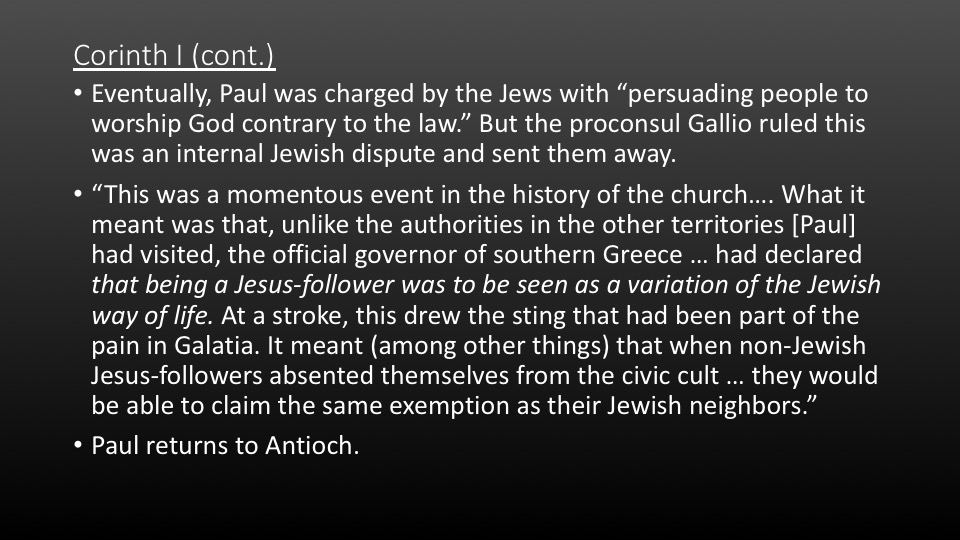
Corinth I (cont.)
Eventually, Paul was charged by the Jews with “persuading people to worship God contrary to the law.” But the proconsul Gallio ruled this was an internal Jewish dispute and sent them away.
“This was a momentous event in the history of the church…. What it meant was that, unlike the authorities in the other territories [Paul] had visited, the official governor of southern Greece … had declared that being a Jesus-follower was to be seen as a variation of the Jewish way of life. At a stroke, this drew the sting that had been part of the pain in Galatia. It meant (among other things) that when non-Jewish Jesus-followers absented themselves from the civic cult … they would be able to claim the same exemption as their Jewish neighbors.”
Paul returns to Antioch.
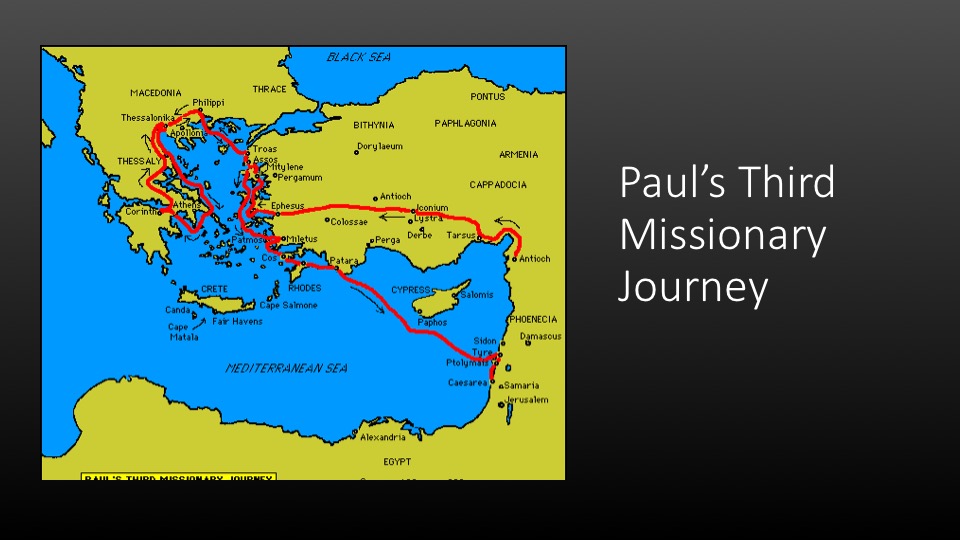
Paul’s Third Missionary Journey
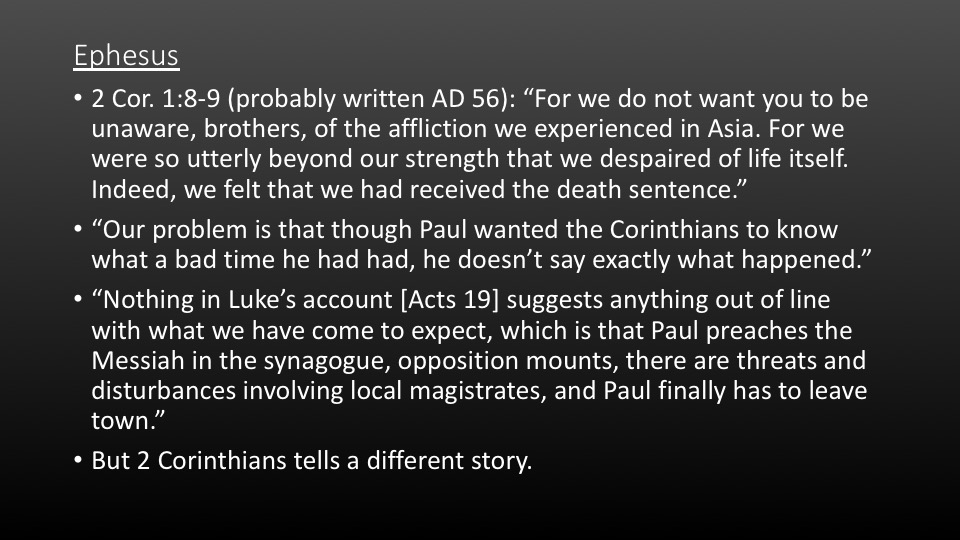
Paul A Biography [Scripture]
2 Corinthians 1:8-9
8 Brothers and sisters, we don’t want you to be unaware of the troubles that we went through in Asia. We were weighed down with a load of suffering that was so far beyond our strength that we were afraid we might not survive. 9 It certainly seemed to us as if we had gotten the death penalty. This was so that we would have confidence in God, who raises the dead, instead of ourselves.
Ephesus
2 Cor. 1:8-9 (probably written AD 56): “For we do not want you to be unaware, brothers, of the affliction we experienced in Asia. For we were so utterly beyond our strength that we despaired of life itself. Indeed, we felt that we had received the death sentence.”
“Our problem is that though Paul wanted the Corinthians to know what a bad time he had had, he doesn’t say exactly what happened.”
“Nothing in Luke’s account [Acts 19] suggests anything out of line with what we have come to expect, which is that Paul preaches the Messiah in the synagogue, opposition mounts, there are threats and disturbances involving local magistrates, and Paul finally has to leave town.”
But 2 Corinthians tells a different story.
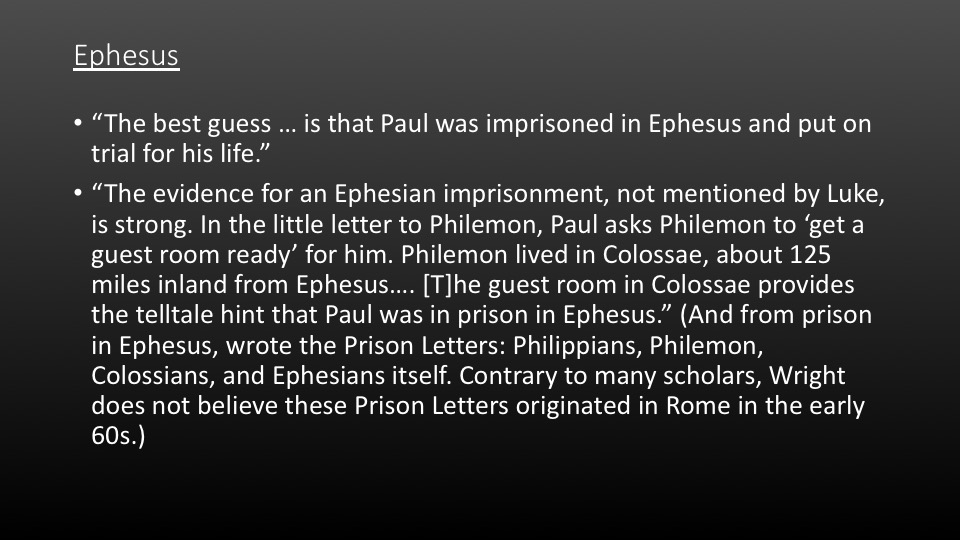
Ephesus
“The best guess … is that Paul was imprisoned in Ephesus and put on trial for his life.”
“The evidence for an Ephesian imprisonment, not mentioned by Luke, is strong. In the little letter to Philemon, Paul asks Philemon to ‘get a guest room ready’ for him. Philemon lived in Colossae, about 125 miles inland from Ephesus…. [T]he guest room in Colossae provides the telltale hint that Paul was in prison in Ephesus.” (And from prison in Ephesus, wrote the Prison Letters: Philippians, Philemon, Colossians, and Ephesians itself. Contrary to many scholars, Wright does not believe these Prison Letters originated in Rome in the early 60s.)
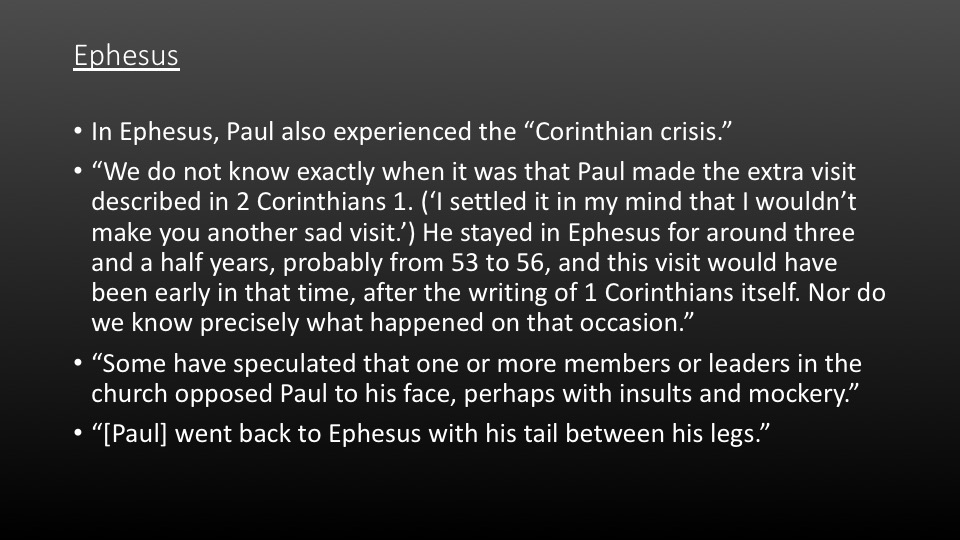
Paul A Biography {Scripture]
2 Corinthians 2:1
1 So I decided that, for my own sake, I wouldn’t visit you again while I was upset.
Ephesus
In Ephesus, Paul also experienced the “Corinthian crisis.”
“We do not know exactly when it was that Paul made the extra visit described in 2 Corinthians 2:1 (‘I settled it in my mind that I wouldn’t make you another sad visit.’) He stayed in Ephesus for around three and a half years, probably from 53 to 56, and this visit would have been early in that time, after the writing of 1 Corinthians itself. Nor do we know precisely what happened on that occasion.”
“Some have speculated that one or more members or leaders in the church opposed Paul to his face, perhaps with insults and mockery.”
“[Paul] went back to Ephesus with his tail between his legs.”
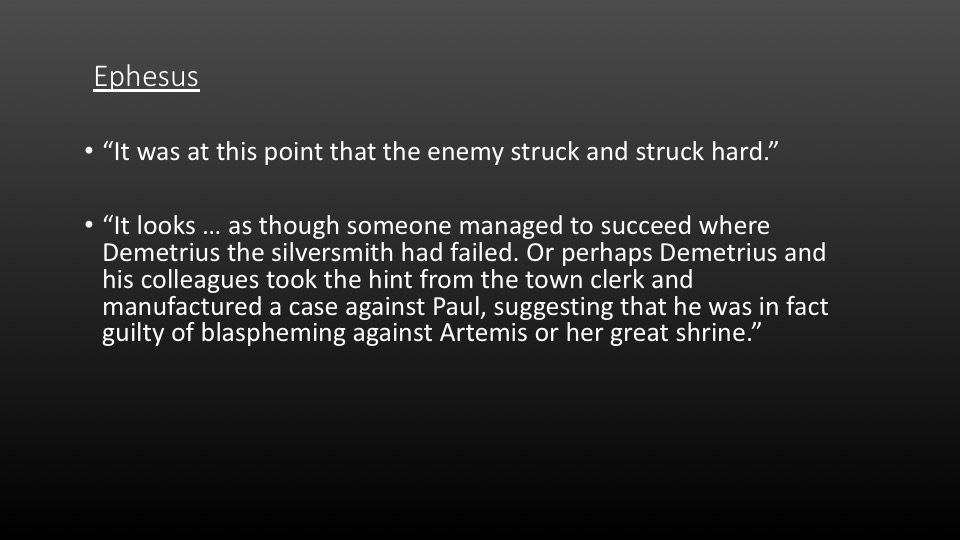
Ephesus
“It was at this point that the enemy struck and struck hard.”
“It looks … as though someone managed to succeed where Demetrius the silversmith had failed. Or perhaps Demetrius and his colleagues took the hint from the town clerk and manufactured a case against Paul, suggesting that he was in fact guilty of blaspheming against Artemis or her great shrine.”
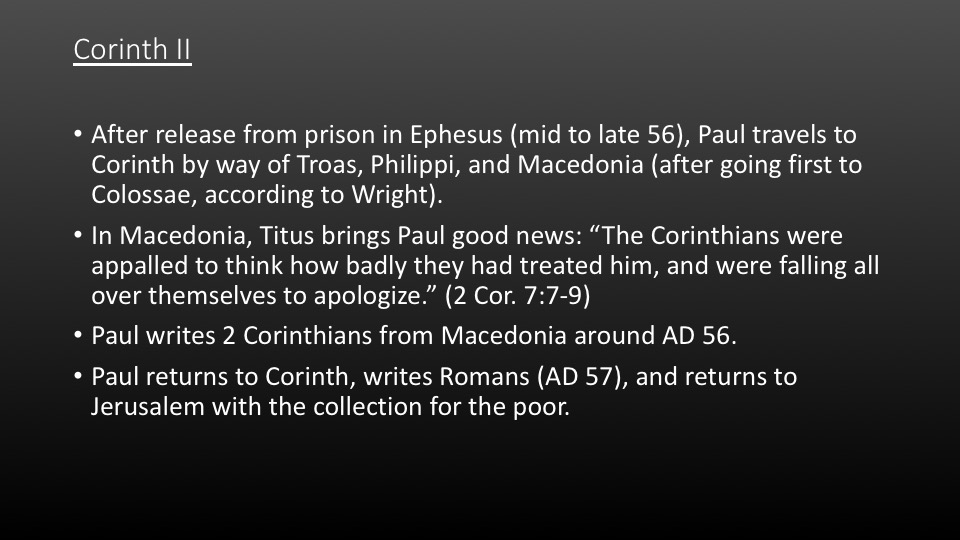
2 Corinthians 7:7-9
7 We weren’t comforted only by his arrival but also by the comfort he had received from you. He told us about your desire to see me, how you were sorry, and about your concern for me, so that I was even happier.
8 Even though my letter hurt you, I don’t regret it. Well—I did regret it just a bit because I see that that letter made you sad, though only for a short time. 9 Now I’m glad—not because you were sad but because you were made sad enough to change your hearts and lives. You felt godly sadness so that no one was harmed by us in any way.
Corinth II
After release from prison in Ephesus (mid to late 56), Paul travels to Corinth by way of Troas, Philippi, and Macedonia (after going first to Colossae, according to Wright).
In Macedonia, Titus brings Paul good news: “The Corinthians were appalled to think how badly they had treated him, and were falling all over themselves to apologize.” (2 Cor. 7:7-9)
Paul writes 2 Corinthians from Macedonia around AD 56.
Paul returns to Corinth, writes Romans (AD 57), and returns to Jerusalem with the collection for the poor.
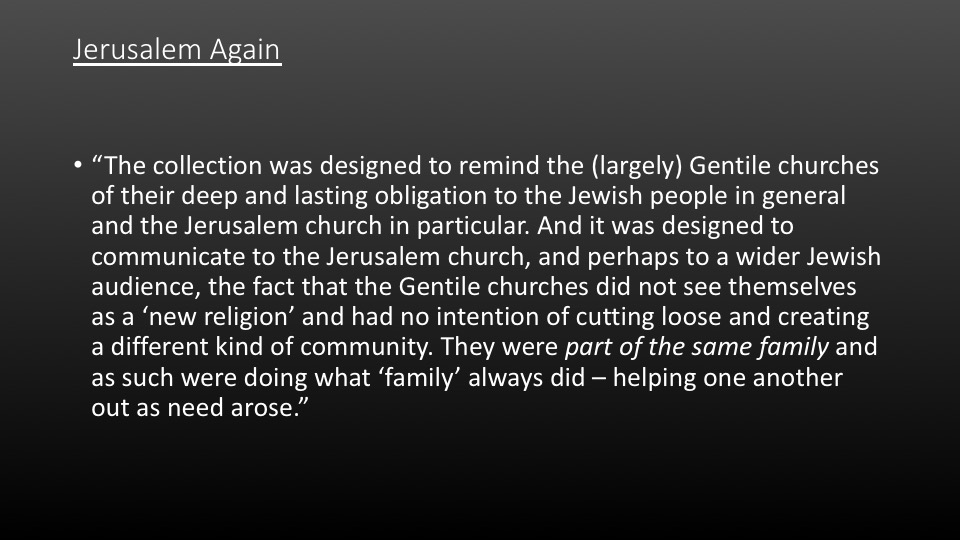
Jerusalem Again
“The collection was designed to remind the (largely) Gentile churches of their deep and lasting obligation to the Jewish people in general and the Jerusalem church in particular. And it was designed to communicate to the Jerusalem church, and perhaps to a wider Jewish audience, the fact that the Gentile churches did not see themselves as a ‘new religion’ and had no intention of cutting loose and creating a different kind of community. They were part of the same family and as such were doing what ‘family’ always did – helping one another out as need arose.”
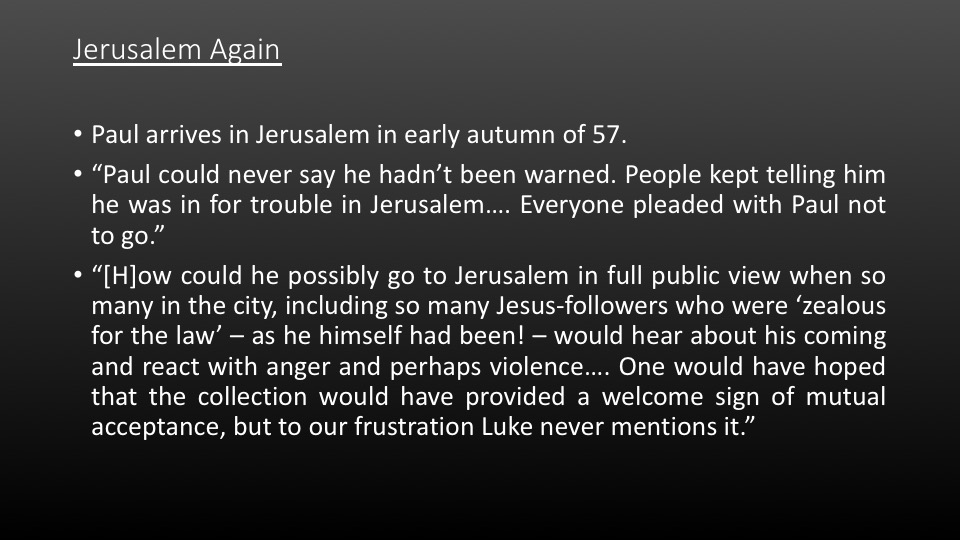
Jerusalem Again
Paul arrives in Jerusalem in early autumn of 57.
“Paul could never say he hadn’t been warned. People kept telling him he was in for trouble in Jerusalem…. Everyone pleaded with Paul not to go.”
“[H]ow could he possibly go to Jerusalem in full public view when so many in the city, including so many Jesus-followers who were ‘zealous for the law’ – as he himself had been! – would hear about his coming and react with anger and perhaps violence…. One would have hoped that the collection would have provided a welcome sign of mutual acceptance, but to our frustration Luke never mentions it.”
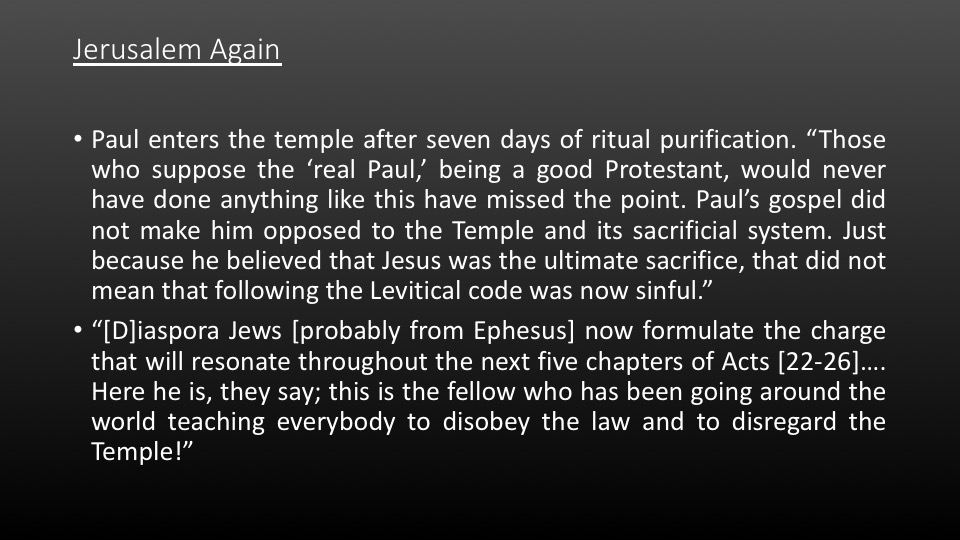
Jerusalem Again
Paul
enters the temple after seven days of ritual purification. “Those who suppose
the ‘real Paul,’ being a good Protestant, would never have done anything like
this have missed the point. Paul’s gospel did not make him opposed to the
Temple and its sacrificial system. Just because he believed that Jesus was the
ultimate sacrifice, that did not mean that following the Levitical code was now
sinful.”
“[D]iaspora Jews [probably from Ephesus] now formulate the charge that will resonate throughout the next five chapters of Acts [22-26]…. Here he is, they say; this is the fellow who has been going around the world teaching everybody to disobey the law and to disregard the Temple!”
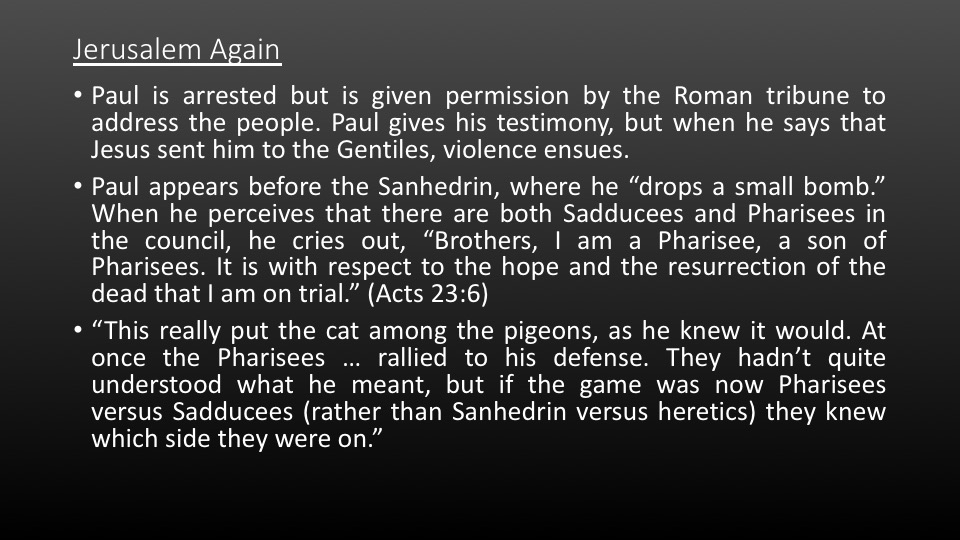
Paul A Biography [Scripture]
Acts 23:6-10
6 Knowing that some of them were Sadducees and the others Pharisees, Paul exclaimed in the council, “Brothers, I’m a Pharisee and a descendant of Pharisees. I am on trial because of my hope in the resurrection of the dead!” 7 These words aroused a dispute between the Pharisees and Sadducees, and the assembly was divided. 8 This is because Sadducees say that there’s no resurrection, angel, or spirit, but Pharisees affirm them all. 9 Council members were shouting loudly. Some Pharisees who were legal experts stood up and insisted forcefully, “We find nothing wrong with this man! What if a spirit or angel has spoken to him?” 10 The dispute became so heated that the commander feared they might tear Paul to pieces. He ordered soldiers to go down and remove him by force from their midst. Then they took him back to the military headquarters.
Jerusalem Again
Paul is arrested but is given permission by the Roman tribune to address the people. Paul gives his testimony, but when he says that Jesus sent him to the Gentiles, violence ensues.
Paul appears before the Sanhedrin, where he “drops a small bomb.” When he perceives that there are both Sadducees and Pharisees in the council, he cries out, “Brothers, I am a Pharisee, a son of Pharisees. It is with respect to the hope and the resurrection of the dead that I am on trial.” (Acts 23:6)
“This really put the cat among the pigeons, as he knew it would. At once the Pharisees … rallied to his defense. They hadn’t quite understood what he meant, but if the game was now Pharisees versus Sadducees (rather than Sanhedrin versus heretics) they knew which side they were on.”
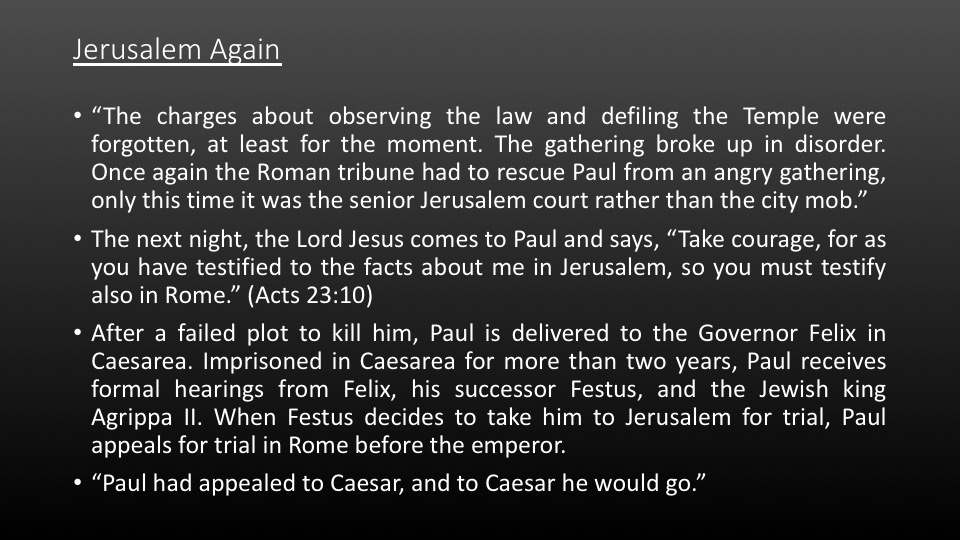
Acts 23:11
11 The following night the Lord stood near Paul and said, “Be encouraged! Just as you have testified about me in Jerusalem, so too you must testify in Rome.”
Jerusalem Again
“The charges about observing the law and defiling the Temple were forgotten, at least for the moment. The gathering broke up in disorder. Once again the Roman tribune had to rescue Paul from an angry gathering, only this time it was the senior Jerusalem court rather than the city mob.”
The next night, the Lord Jesus comes to Paul and says, “Take courage, for as you have testified to the facts about me in Jerusalem, so you must testify also in Rome.” (Acts 23:11)
After a failed plot to kill him, Paul is delivered to the Governor Felix in Caesarea. Imprisoned in Caesarea for more than two years, Paul receives formal hearings from Felix, his successor Festus, and the Jewish king Agrippa II. When Festus decides to take him to Jerusalem for trial, Paul appeals for trial in Rome before the emperor.
“Paul had appealed to Caesar, and to Caesar he would go.”
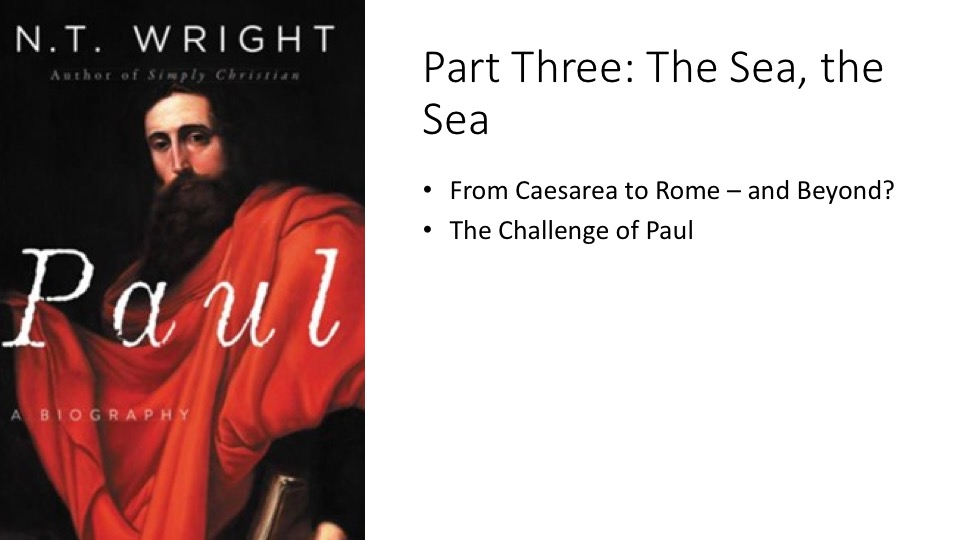
Part Three: The Sea, the Sea
•From Caesarea to Rome – and Beyond?
•The Challenge of Paul
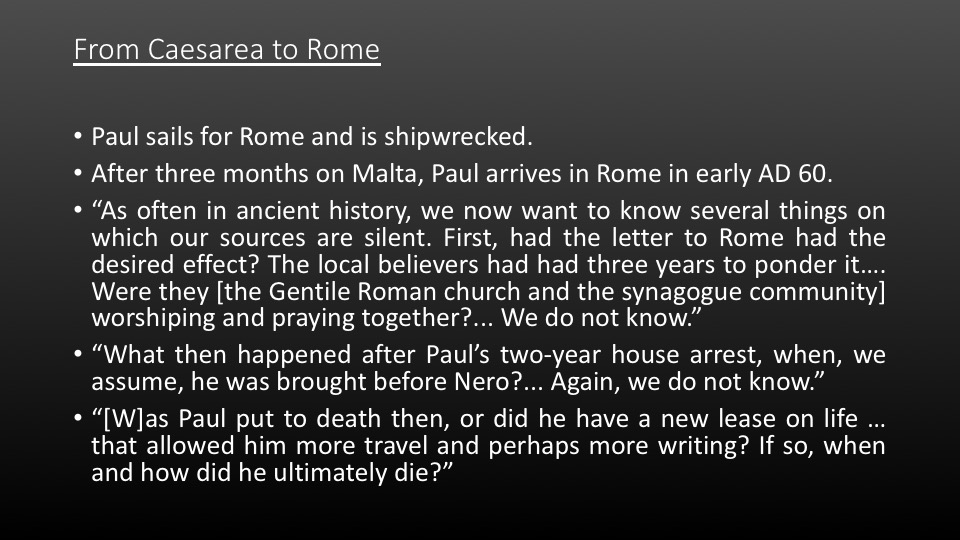
From Caesarea to Rome
Paul sails for Rome and is shipwrecked.
After three months on Malta, Paul arrives in Rome in early AD 60.
“As often in ancient history, we now want to know several things on which our sources are silent. First, had the letter to Rome had the desired effect? The local believers had had three years to ponder it…. Were they [the Gentile Roman church and the synagogue community] worshiping and praying together?... We do not know.”
“What then happened after Paul’s two-year house arrest, when, we assume, he was brought before Nero?... Again, we do not know.”
“[W]as Paul put to death then, or did he have a new lease on life … that allowed him more travel and perhaps more writing? If so, when and how did he ultimately die?”
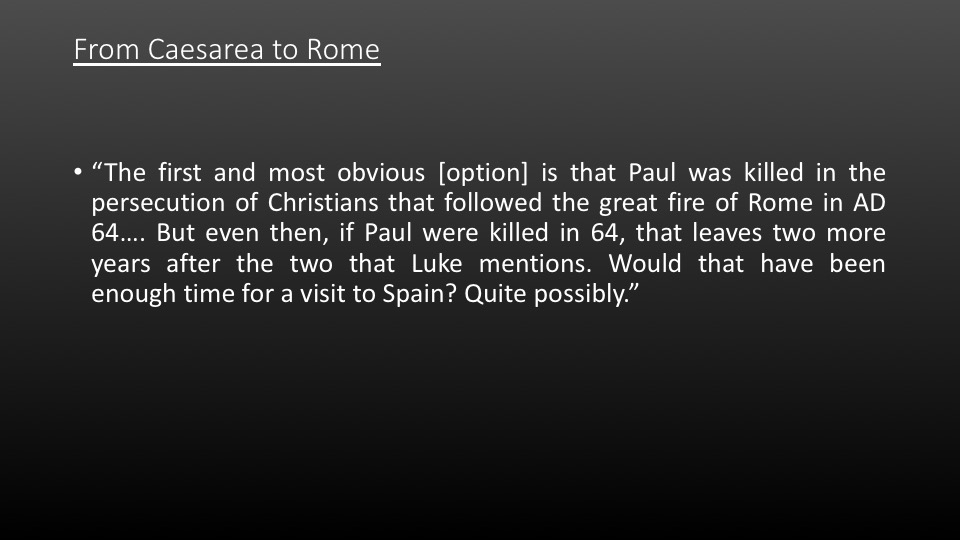
From Caesarea to Rome
“The first and most obvious [option] is that Paul was killed in the persecution of Christians that followed the great fire of Rome in AD 64…. But even then, if Paul were killed in 64, that leaves two more years after the two that Luke mentions. Would that have been enough time for a visit to Spain? Quite possibly.”

The Challenge of Paul
Readings from pp. 399-400 of N.T Wright’s Paul: A Biography
Paul A Biography
Links
< Home Page >
Scripture taken from the Common English Bible®, CEB® Copyright © 2010, 2011 by Common English Bible.™ Used by permission. All rights reserved worldwide. The "CEB" and "Common English Bible" trademarks are registered in the United States Patent and Trademark Office by Common English Bible. Use of either trademark requires the permission of Common English Bible.